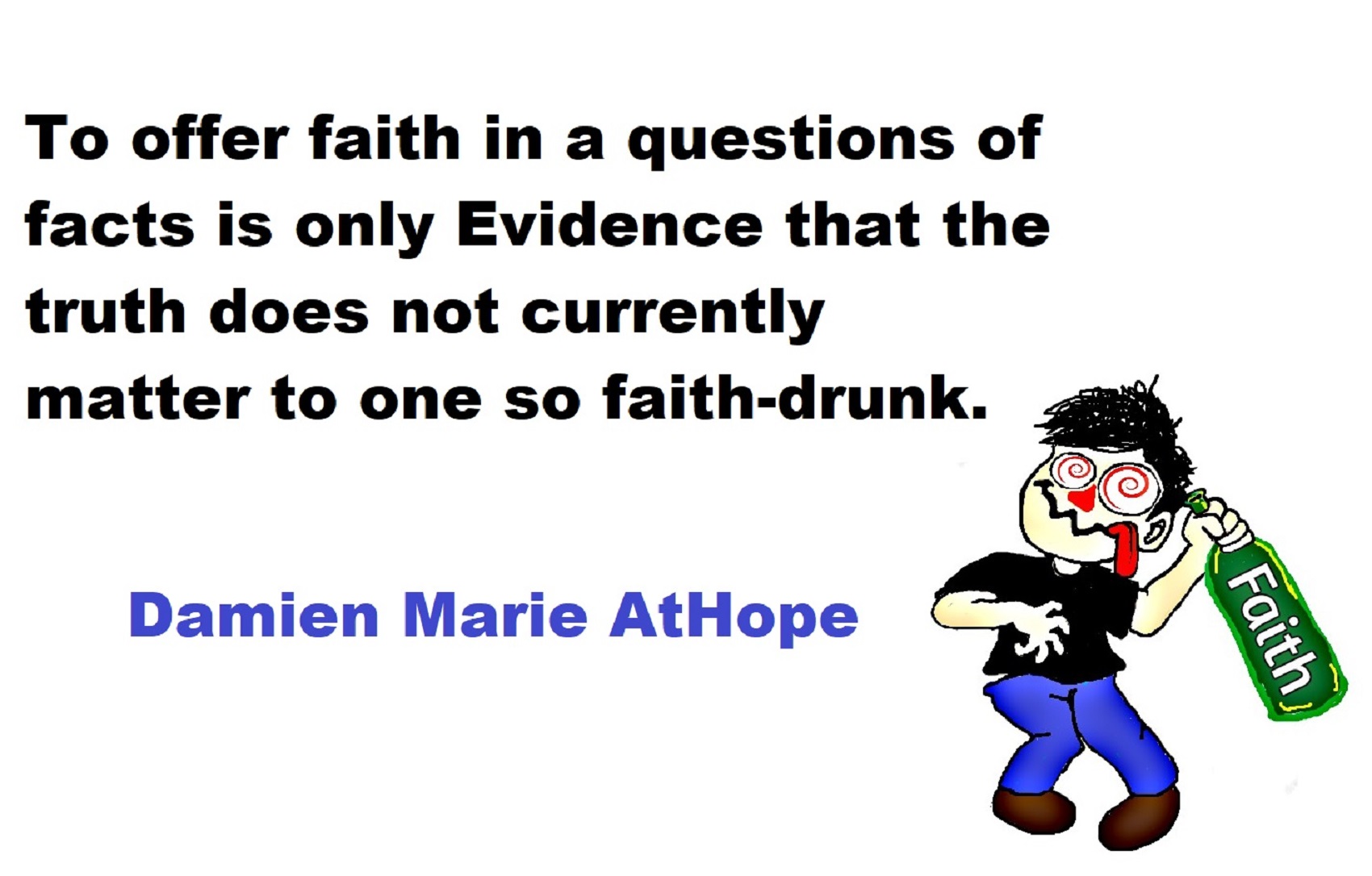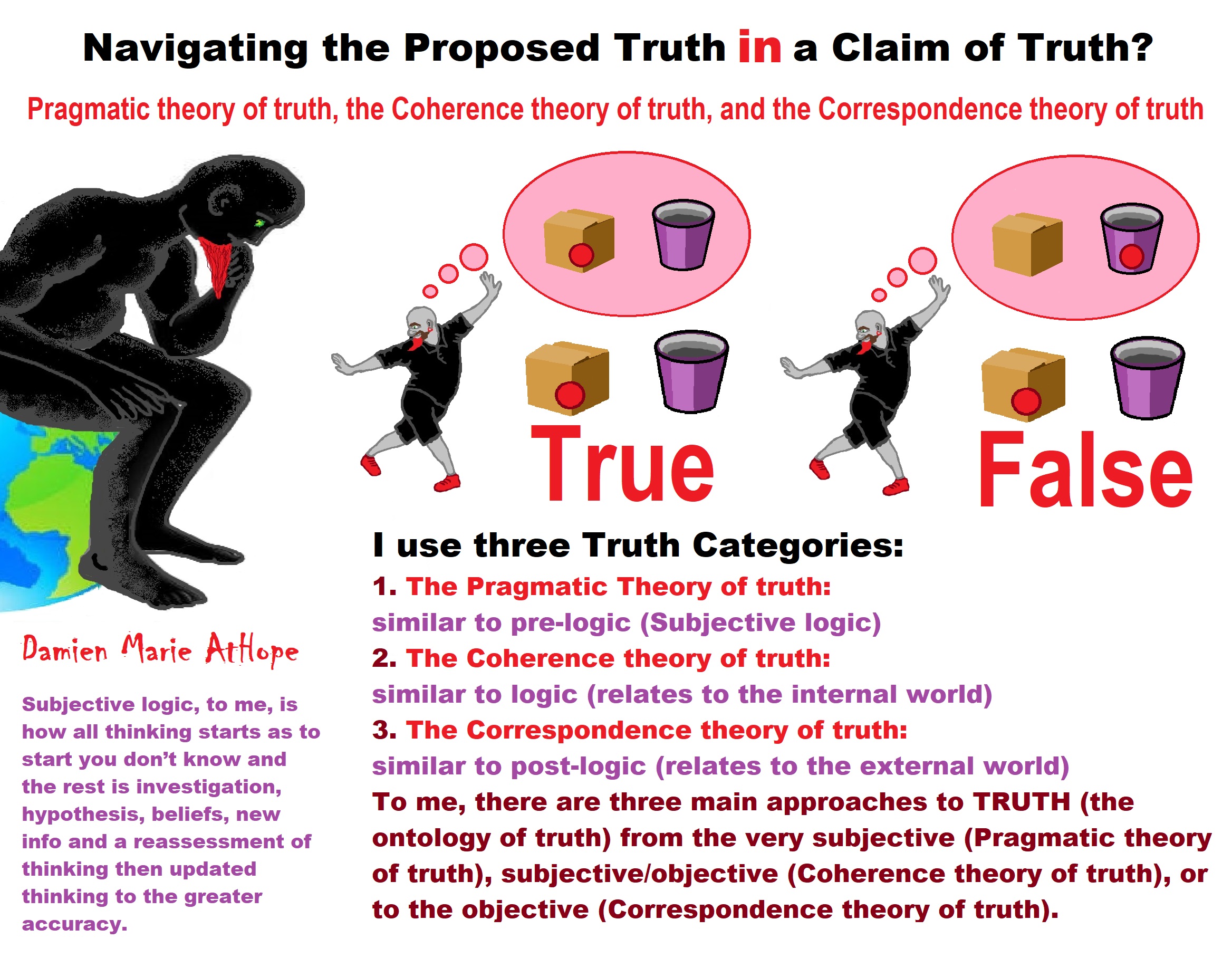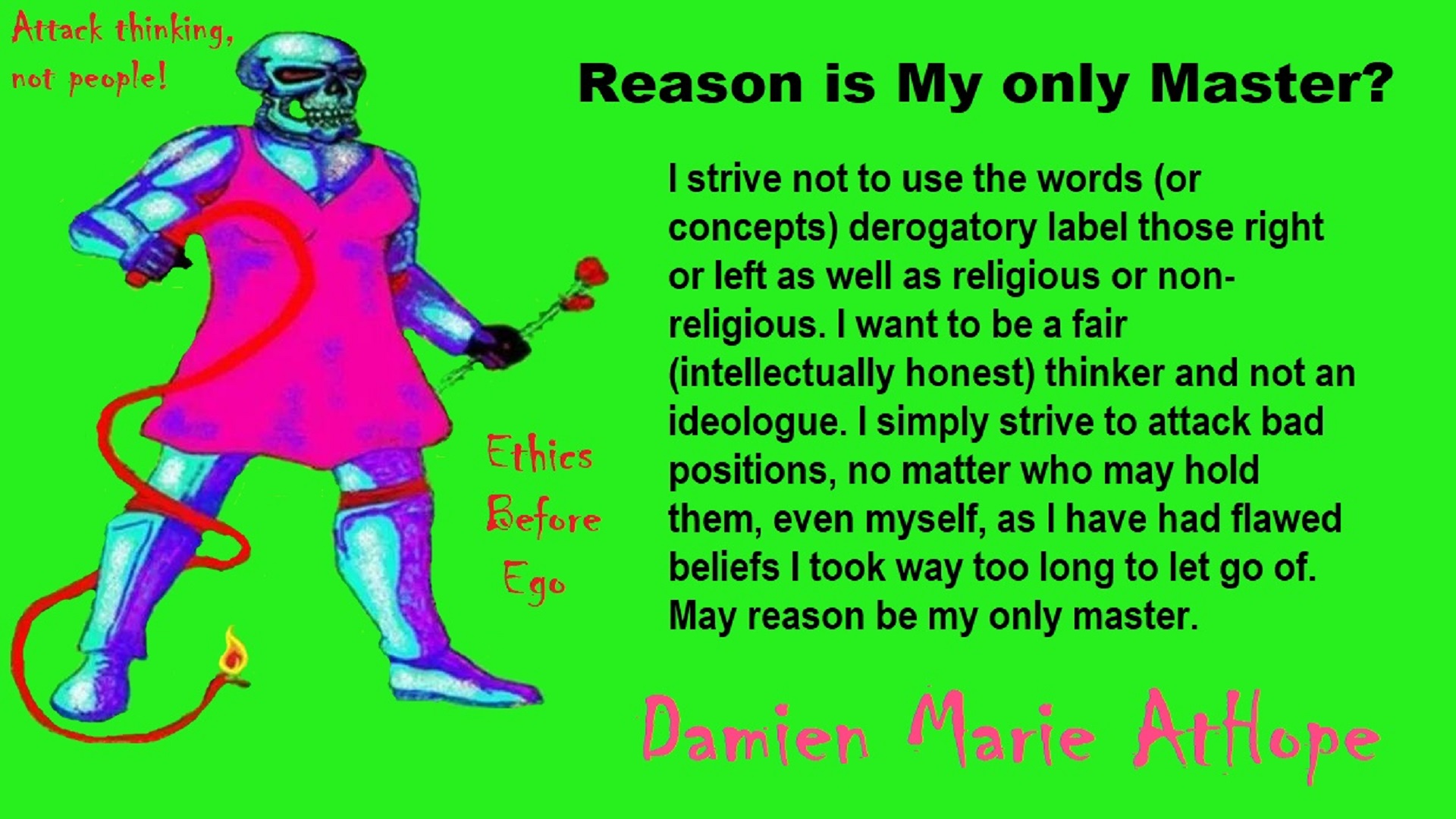
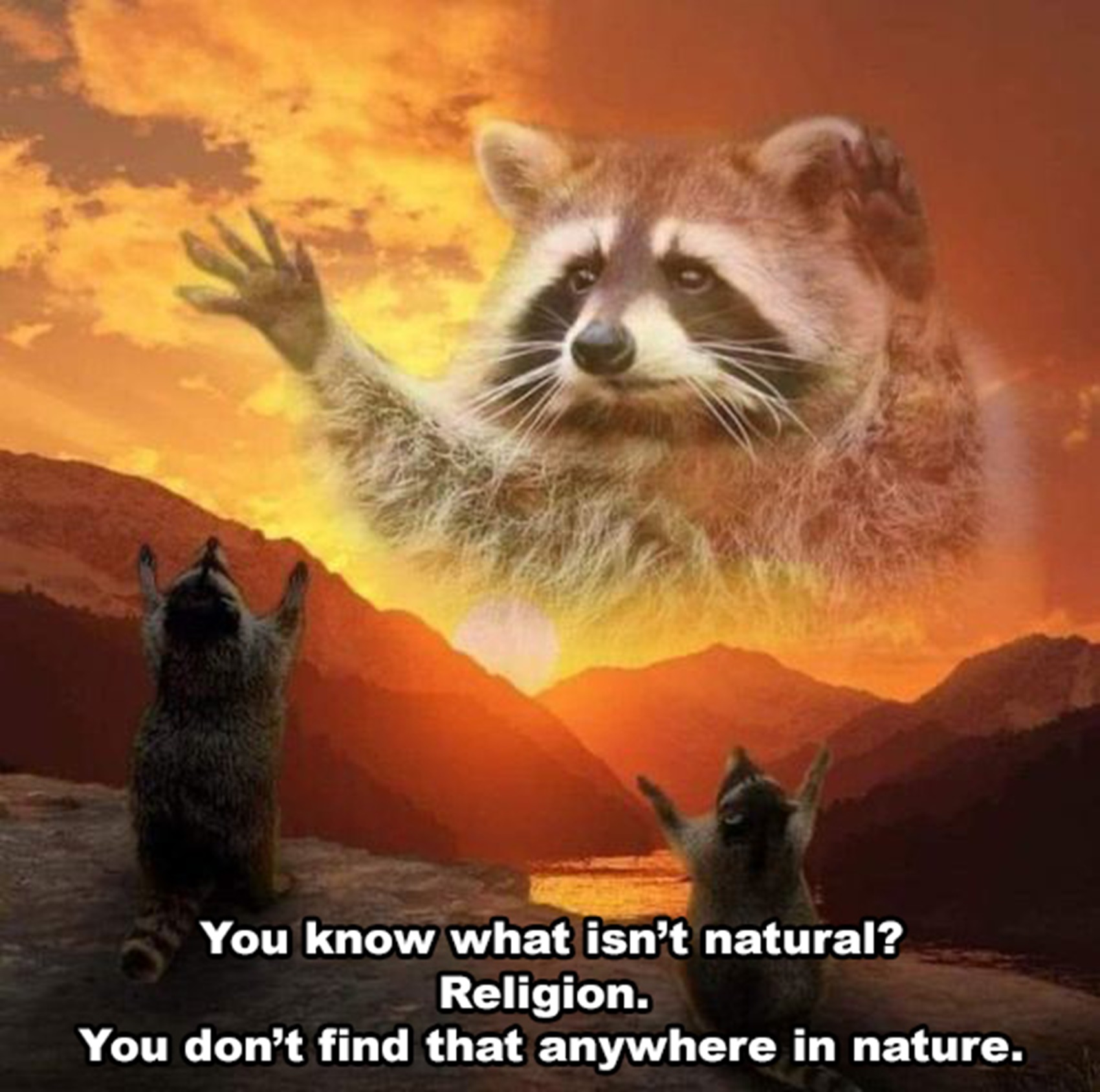
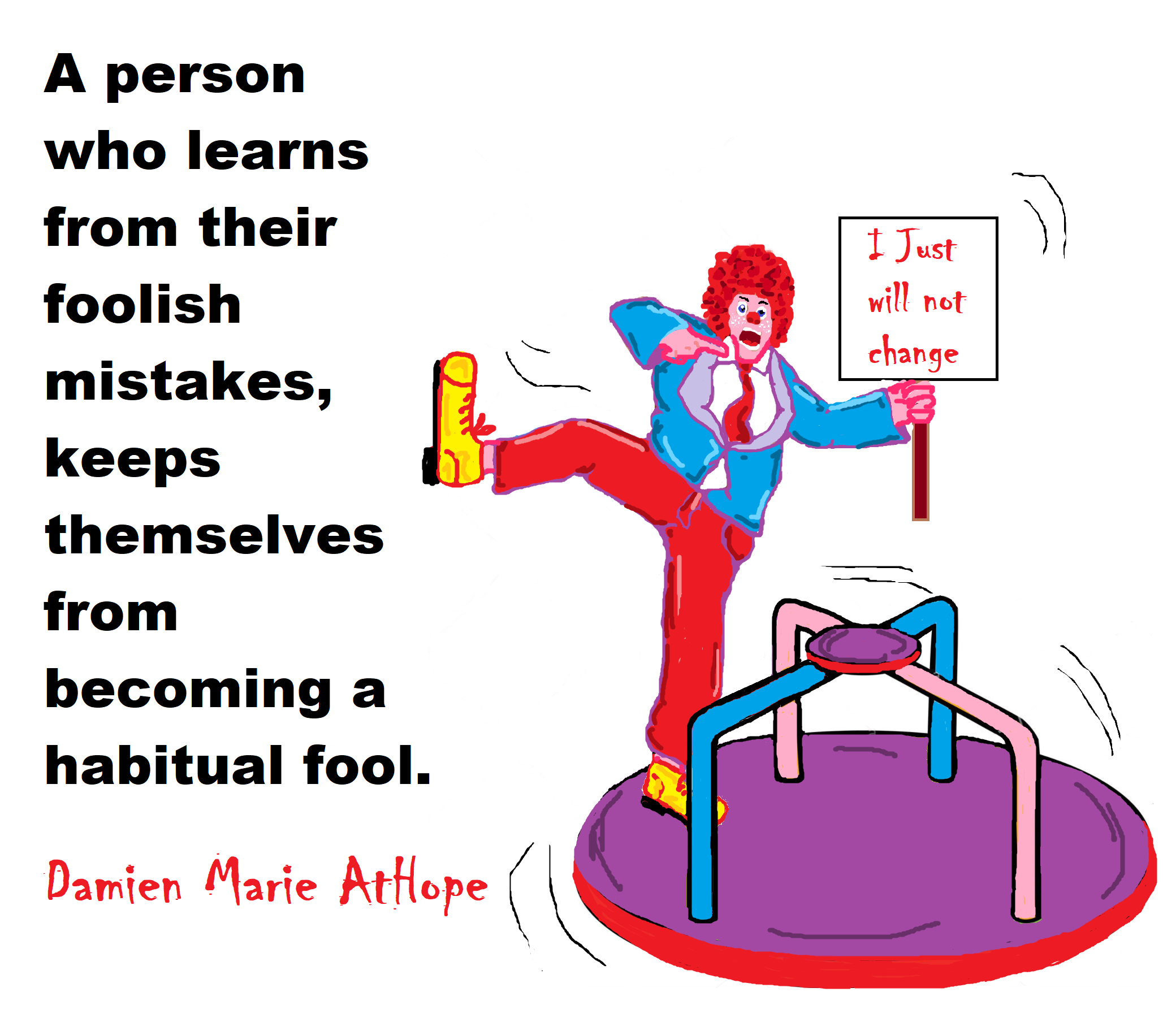
Objective and Subjective Logic?
Getting Real with Logic
Logic is the result of rationalism, as what do you think gets you to logic if not starting at reason? I want to hear your justification for your claims, all the presuppositions you are evading to explain the links in your claims of truth. As it is invalid to just claim this without a justification for your professed claims and the presupposing you do to get there, that is not trying to use rationalism to refuse rationalist thinking. How are you making the statement and not appearing to what is the rationale behind it? If not, you must want to think “Logic is self-generating as valid” and this understood value is to you not reducible to reason? You are devoid of an offer of your burden of proof, first just try to keep up with the thinker’s responsibility to provide more than unjustified claims. Logic is derived by axioms and thus using rationalism to validate them, think otherwise provide your proof.
My Rationalism: is two things externalistic “scientific rationalism” a belief or theory that opinions and actions should be based on reason and knowledge rather than on religious belief or emotional response. And internalistic “philosophic rationalism” the theory that reason is the most base presupposition before all others, rather than simply trying to rely on experience is the foundation of certainty in knowledge. Activating experience occurs we then have thinking, right (methodological) thinking (critical thinking) is reason, right reason is logic, right logic can be used for math, right math in response to the natural world is physics, and from there all other Sciences, physics is the foundation for chemistry and chemistry is the foundation of biology. May reason be your only master and may you also master reason.
Grasping the status of truth (ontology of truth): pre-logic, logic, and post-logic?
Challenging the Supremacy of Reason?
So we start in naive theories/naive logic and subjective-logic/pre-logic, then we get to reason. Or it can be said like this, activating experience occurs, we then have random emotional heavy thinking, we then use right (methodological) thinking (critical thinking) which is reason, then we move from this to greater accuracy which is right reason and the most formal is like that of logic, moving from there right logic can be used for math, right math in response to the natural world is physics, and from there all other Sciences, physics is the foundation for chemistry and chemistry is the foundation of biology. May reason be your only master and may you also master reason.
To me, the move from unreason to reason starts in what I call a kind of “subjective logic”, pre-logic, because we start in unreason and non-order thinking, so the first action in thinking is “naive theory” of things and thus needed thinking actions in a norm forming prosses to add a methodological style thinking and “subjective logic” which is a type of probabilistic logic.
“Naive set theory is any of several theories of sets used in the discussion of the foundations of mathematics. Unlike axiomatic set theories, which are defined using formal logic, naive set theory is defined informally, in natural language. Unlike axiomatic set theories, which are defined using formal logic, naive set theory is defined informally, in natural language. A naive theory in the sense of “naive set theory” is a non-formalized theory, that is, a theory that uses a natural language to describe sets and operations on sets. The words and, or, if … then, not, for some, for every are treated as in ordinary mathematics. As a matter of convenience, use of naive set theory and its formalism prevails even in higher mathematics – including in more formal settings of set theory itself.” ref
“Subjective logic is a type of probabilistic logic that explicitly takes epistemic uncertainty and source trust into account. In general, subjective logic is suitable for modeling and analyzing situations involving uncertainty and relatively unreliable sources. For example, it can be used for modeling and analyzing trust networks and Bayesian networks. A fundamental aspect of the human condition is that nobody can ever determine with absolute certainty whether a proposition about the world is true or false. In addition, whenever the truth of a proposition is expressed, it is always done by an individual, and it can never be considered to represent a general and objective belief. These philosophical ideas are directly reflected in the mathematical formalism of subjective logic.” ref
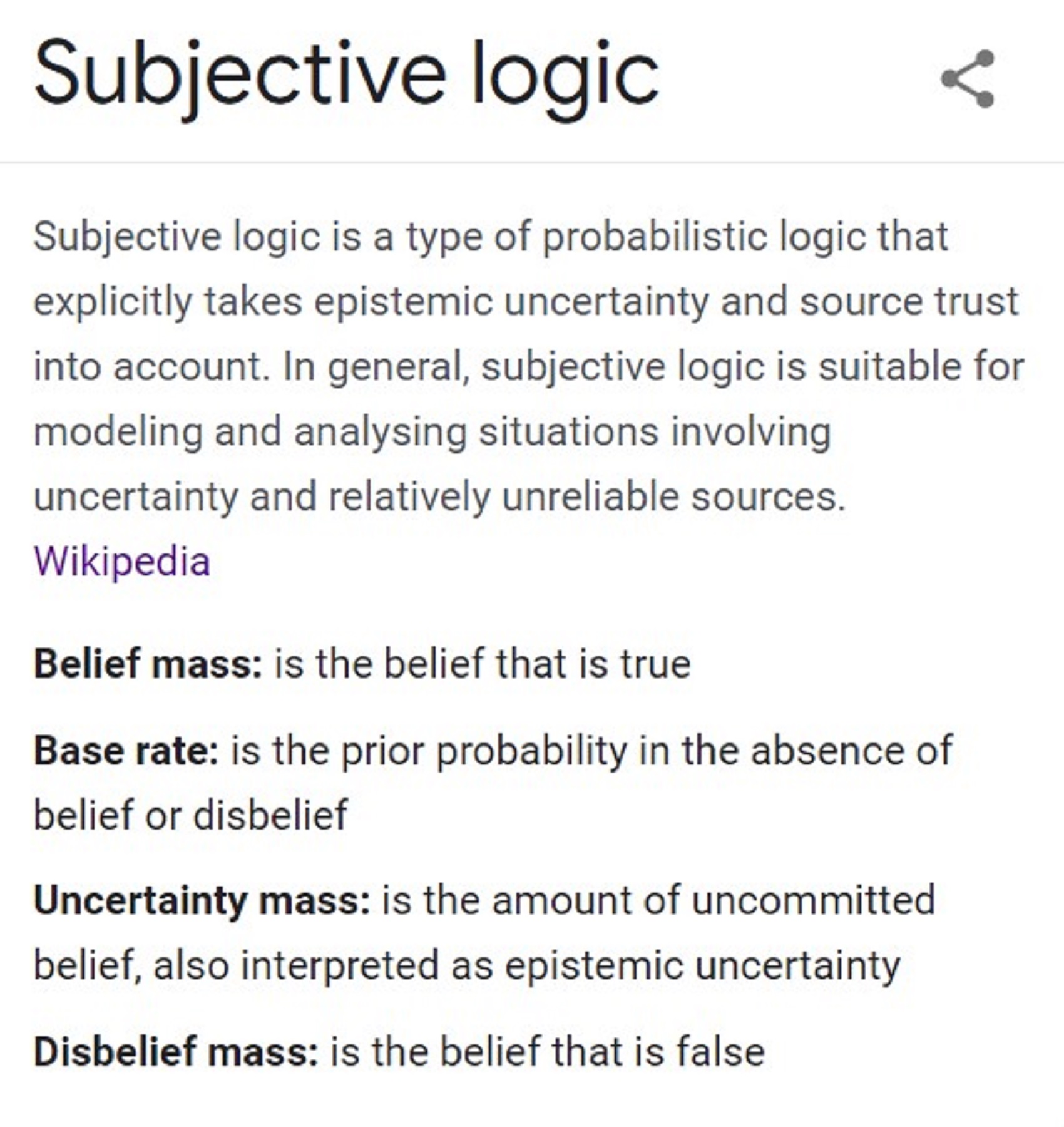
To me, a simple point is being made as complicated as it can be but the point is we are not using faith to get to “Reason,” logic, truth, nor knowledge claims. So science that also in the most basic philosophical way starts as I explained too but they simply assume all this as unstated or even unrealized but still all connected to all higher certainty, of which science relies upon.
I wrote a post, then received a challenger this is our dialogue:
“Forget it, I am not that concerned with how my truth hurts your beliefs as I am at how your beliefs hurt the truth…”
“Subjective or objective truth?” – Challenger
My response, What about it are you asking, please restate your question? Thanks. Here is my blog post, “Grasping the status of truth (ontology of truth)” https://damienmarieathope.com/2016/09/18/grasping-the-status-of-truth-ontology-of-truth/
“Questioning your meaning of the word “truth” that you used above. The second mention of the word to be exact, as the first mention is obviously suggestive.” – Challenger
Damien Marie AtHope, I posted my blog on the ontology of truth.
“I don’t care to read your blog, thanks anyway. I’m aware of the different types of “truth.” – Challenger
Damien Marie AtHope, Cool.
“You’re good at shrugging people off, btw, experienced your talent at the Reason Rally also.” – Challenger
Damien Marie AtHope, Is that meant as a compliment or an Insite you feel should show me where I can improve as a person?
“I honestly wondered then, and I’m wondering again now if you’re just a billboard for yourself or an atheist activist. Just being perfectly honest, nothing more.” – Challenger
My response, Well, I always welcome true correction if it is needed. And I will consider what you said and hear how you felt experiencing me. I always with to improve do thanks for bringing it to my attention.
“Simple questions can have simple answers. And it’s good to know who your fellow activists are.” – Challenger
My response, I hope to demonstrate with my life that I want to make a positive impact on the world as much as I can.
“Well that was a great generic blow-by. And for me three strikes you’re out. Have a nice evening.” – Challenger
My response, Challenger I appreciate your support and helpful critique. I wish you a wonderful night.
“Um ok, haha. Have you ever talked to a call center person that is clearly reading a script and doesn’t seem to realize they can veer from it? Nvrmnd, night. Ooh, it’s maybe more like asking questions from a beauty queen. Not sure which is more accurate now, hmmm. Sorry, just having some late night fun.” – Challenger
My response, Interesting, can you give me more detailed information, please, so I can get what you think, I need to work towards.
“HAHA! Is this Damien, or the person handling his calls? Lol” – Challenger
My response, It’s me, you met me at a event, to which, I met with 80 fans there besides you. I was on fire and was likely over the top and when I am that way I can tend to be somewhat thoughtless of the needs of others while I am trying to get my ideas across. I do need to work on this and I am
“Perfectionist?” – Challenger
My response, Am I a perfectionist? Well, t Is a act of protection attainable in a singular and well defined set? Yes. I largest see us as trying to find a state of equilibrium that even if for an instance it is reached it is just as quickly overturn and the battle is back again working for more calm in life’s storm.
“Omg, who ARE you? Am I the only person who thinks your responses are uncannily canned? Lol Srsly, are you for real? Do you always talk like this? “Is a act of protection attainable in a singular and well defined set? Yes.” What does this even mean?! I clearly need to take a class or something. Didn’t intend on ridicule here, but the statements have been so robotic here that I just couldn’t help myself. Especially because it’s the middle of the night and I’m delirious, it’s so hilarious haha!” – Challenger
My response, Right on. \m/
“Damien, I’m guessing I’m not the first person to bring up this strangeness about how you talk?” – Challenger
My response, To answer your question, I have been told all my life I need to be more aware of others in society and managed my behavior intensity and thoughtless towards others. I have had individual, marriage, family, and group counseling. I have overcome a life of destruction and been working my way to a new normal where not only do I stop intentionally hurting people I needed to start truly helping others. Am I great at it always no not really. I have had to going from a feeling as a 15-year-old full of hate and rage and out to find trouble I was a problem where I went as I was out to have fun. I am far from the self-child but sadly I am still him. I am a product of myself experience and actions. Therefore, I wish to champion worthy efforts and there can hardly be more worthy efforts then self-improvement.
“I’m hearing Nike’s slogan in my head right now… lol” – Challenger
Damien Marie AtHope, can give you a video where I fully explain it, Well not fully it’s dark mean and sad it’s truly sad. I cry for the hurting child I was.
Damien Marie AtHope, I have experienced the following forms of child abuse:
*Physical
*Sexual
*Psychological
*Starvation
*Improperly clothed
*Unsheltered
*Abandoned
*Punched
*Extreme spanking
*Hit with a 2 x 4, braking both my tail bone and my inner being turning me rage. I was the beaten animal pushed into the final corner and I was going try and kill anyone who got in my way or threatens me at all. I am not that person to say. But the dark post cards of my heart are not blank they sing deep of my unworthiness my failure to even be human. I was ones less than nothing. I think I can say how I see you what I want to do is to champion the war on ignorance, selfishness aggression and indifference. I will now try and say what I see as my life goals. Just think if a military service person were to say they think, I want to live my life for others and even am writing to die for them we call that a hero. I want to be such a hero for kindness. When I was young, I valued and longed for power as I developed I saw the power in knowledge and longed for development of intelligence. Now that I have gained knowledge, I see with the value of wisdom and it is me that has developed for I understand that my greatest power is kindness. My life as a child and my life now can be summed up in three words:
*As a Child: hurt, hate, and harm.
*As an Adult: openness, hope, and kindness.
Here is a poem/liter to my abusive father:
“Father is an “F” word”
(content warning: Child Abuse Subject)
Father…
Do you hear me I want you to understand what I went through and how you’re parenting affected me and what it produced? So, you can understand what I want you need to make amends for. Not that you ever will…. You may have had the title may have even been my father but you were never my DAD.
I felt fear as a child because of you…
I had to steal to eat as a child because of you…
I felt stupid as a child because of you…
I had to eat dog food as a child because of you…
I had to go to the bathroom outside like a dog as a child because of you…
I felt shame as a child because of you…
I had to break into my home house as a child because of you…
I hated christians as a child from birth until 15 because of you…
I had no friends as a child because of you…
I was unsafe as a child because of you…
I felt unlovable as a child because of you…
I felt everything I did was wrong as a child because of you…
I was humiliated for who I was as a child because of you…
I felt alone because you had babysitters for my brother and sister and not me as a child because of you…
I learned to value hate over love as a child because of you…
I felt mistrust as a child because of you…
I was abused as a child because of you…
I was neglected as a child because of you…
I was abandoned as a child because of you…
I was misused made to be your masseur and slave as a child because of you…
I felt I could never be good enough as a child because of you…
I was made into a secondary dad to my siblings and punished for their wrongs as a child because of you…
I never knew love from my father but I did understand hurt as a child because of you…
I lost my sweet innocence as a child because of you…
I feared life more than death as a child because of you…
Instead of looking into my father’s eyes and seeing love I saw selfish darkness…
You committed many sins against me but most of all your biggest problem is you are selfishness. I think that has more to do with why you committed such atrocities and have the problems still today.
So, FUCK You for fucking up me…
p.s. This is vary heartfelt and raw for me, it is me talking to the fucker that was my father but never a dad. I have not talked to you in 20. In my life, I was extremely abused physically, mentally, abandoned, neglected, starved, etc. etc. I have overcome a lot, had much counseling but I never got to say “FUCK YOU.” YOUR son!!!!!
Here is poem I wrote in my late teens full of rage and pain,
“Rage”
Burning black,
Hold tight for the heart attack.
Slit wrist to a new time.
Clotted thoughts,
Do it now!
Take the night watch as the tables turn.
Hold tight for the heart attack.
Burning black,
Push me back, past is too close, future is too far.
Feel the back stab,
Slid to a time cold as a slab.
I fear you.
Now you, will Fear me.
Steal me, spit me out.
I just come back again.
Burning black, hold tight for a heart attack.
Suffocating on you.
Now your Choking on me.
New rush, flush it all.
See my eyes, fear the lies ahead,
But watch your back.
When others show us their humility, one is set to comparison; which lingers in one’s mind, like the sweetness of Honey, so to, is such character a furthering of honest shared connectedness. An example of self-love, is my desire to master self.
I then decided to posted this message on my timeline to the public:
I was challenged that they did not think I was a real activist so I ask you as I am very open to hear from others as I desire a life of self-improvement. So, the question is this your impressions of me? Thanks for your help.
*Wendy responded, I think that you are 100% activist. Almost everything you do is to advance a good cause. That’s activism in my book.
*Michael responded, I see the steps you take both online and off to help others, that’s the definition of activism to me
*Mike responded, I’ve seen where you have spoke at gathering outside or at an event by what you have shared. I’ve seen post after post about religions and indoctrination. You have taught me different things about different religions that in all honesty was to lazy to look into myself. I think you are an activist. Because you put yourself out there to be critiqued by both those who agree and those who disagree with you. All you ask is for honest and open dialogue and let facts and logic guide you.
*Dianna responded, That is not at all my impression. Always remember that you are under no obligation to prove yourself to anyone. You know who you are and the good work that you do.
*Kimberley responded, Ok…as always…who are THEY??? And they need prey tell their definition of an activist. In my atheist eyes….you my friend are 100% activist. You travel everywhere you can…you need a clone. Very proud as I view all your photo’s. Making a statement. Badass my friend.
*Pedro responded, Damien, why I like you is you think outside the box.
Then the Challenger responded on there too, I didn’t think you were a real person. Felt like talking to someone holding your place while the real you went to take a leak or something haha. Maybe your personality just doesn’t mesh well with mine, sorry.
My response, I am trying to mesh well with you. 🙂
“And please dear God stop with the self improvement obsession. Life’s too short man, just accept yourself flaws and all and be happy.“ – Challenger
My response, I wish to help others and myself, so I will not stop who I am. I am trying to both understand and do try to help everyone if I can. I of course am not always good and I fail again and again. However, I am a person on a journey to self-improvement so I know I should try to see me through the eyes of others so I can improve my interaction prosaically as I have a mental health issues of being a high functioning sociopath do to extreme child abuse by the hands of religious fanatics. I have had counseling on an of sense I was about 13. So, I don’t deny you may be right. Well I earnestly wish to apologize to you, as I don’t want to make people feel disregarded.
“I never said I felt disregarded. No need to apologize either. Message me please, I’d like to hear more about your story if you get a chance, thanks. I write songs on the subject of atheism fyi.” – Challenger
My response, Thanks, for your interest and kindness. You inspired this ideas in me: One’s character is not proven by posting about it. Rather, it is a moving road the journey we must walk the question I asked myself was am I one of the ones helping or the ones hurting. I want a character so high it fights with people against me if I am in error. Long live emotional intelligence.
“I don’t know if there is a such thing as emotional intelligence, lol but okay okay. night.” – Challenger
My response, Emotional Intelligence: http://www.danielgoleman.info/topics/emotional-intelligence/
*Then Randy responded, What else could you call it if not activism?
Then the Challenger responded to Randy response, Not much if you take it personally. If you don’t then things come to mind like complacency for example.
My response, Challenger “complacency”, that is the most confused statement about me yet, you obviously don’t get me, even though I tried. it’s cool. Hell, I get we all are different, so it’s all good. 😀
I will end with this poem:
“Change”
Sitting back,
I realize all the bad I have done.
I am sorry for all the people I hurt,
For I am not a mean man.
I am sorry for the lives I have ruined,
For I am not an evil man.
Sorry to everyone in life,
For all the wrongs, I have done.
I ask the world for forgiveness!
Sitting back,
I now realize all the bad I have done.
I can change!
And I will.
Here are some similar blogs:
The Challenger continued later, I can see that you have and continue to work hard to be a better person, and I commend that. I’m very different than you in how I approach humans, the world, and life in general as I’m pessimistic by nature. Thanks for sharing your story, it gave me some things to think about. I wish you the best of luck in your endeavors and i hope you continue to heal and one day recover fully from your childhood wounds. I can see why you have an unusual level of self-perfection, but please don’t forget that you’re human and it’s okay to make mistakes. P.S. Ever think about writing a book about your life story?
Damien Marie AtHope, I am an artist, writer, poet, philosopher. and psychological as I have a BA in Psychology/ with Sociology.
“That’s a hefty job title there. Kudos!” – Challenger
Damien Marie AtHope, I have a strong self-concept so I am not as effected by a need to change.
“The abuse I suffered by far pales in comparison, but I sympathies with your struggle very much. I especially took home your words about how you try to look outside yourself instead of being selfish. I need much work on that.” – Challenger
Damien Marie AtHope, I have worked with intercity kid’s in poverty and brokers home in an educational after school program to big brother and big sister them. I want to in a symbolic way give my life to the world to try and make a positive difference.
“Forgive my blatant and sleepy brain, but that sounds like a form of suicide to me. Seems like you’ve found a socially acceptable way to abuse yourself. Can you live with yourself if you were just living life and making mistakes?” – Challenger
My response, No to me it’s altering the dark past to something brute and connected. I enjoyed my life for the first time as a child I was so lost.
“You seem similar to a religious person in the sense that they are living in a state of guilt and worry about behaving perfect for God, except you’re perfect requirement is being handed down by yourself.” – Challenger
My response, I only have naturalism and humanity.
“If requiring yourself to be so “good” makes you happy, then please continue.” – Challenger
My response, I am not just other-love, no, I am quite good, at self-love as well. If issues come up, I try to honestly address them as immediately as I can. That can be harder than it sounds but the cause of humanity it so worthy to me now. An example of self-love us my desire to master self. I am always open if I have time. You are a valuable person and you are a good person. Ok, I fully understand go be a good person and thank you for being so. Childhood should not be a time of hurt and the inward prison to a new freeness without hurt so they can flourish. I have a blog post on Secular or Atheist parenting if you want to check it out.
My response, Atheist Parenting: Atheist Parenting (Info & Resources)
“I read your stuff to my spouse, we really like your poems. Thanks. Gonna watch your story, with him too now.” – Challenger
My response, Right on, I have a goal the make the world a better place as much as I can. Here are some thoughts on that:
“Once I was wrong.”
Once I was wrong. And then wrong again. In fact, I have been wrong all my life. One has not found truth if they believe that they are never wrong. I am sure this plague of my side bias is a fantastic way of not learning new truth; if truth matters to you? Dear thinkers, welcome your being completely shown to be wrong, as who wants to spend another second believing a lie. You don’t honestly want to believe lies or half-truths do you?
Want me to respect your beliefs? Then as a rationalist atheist, I suggest you get respectable beliefs justified with valid and reliable reason as well as evidence for all your claims.
“Damien, my only issue with this notion is that morality is highly subjective. Who is to say someone is right or not? Are tribes in Papua New guinea wrong for ritual cannibalism? Do we have a right to force them out of it because it conflicts with our westernized view of morality? That is the ethical conundrum we have yet to answer sufficiently.” – Challenger
My response, Well, there is moral reasoning and prosocial behavior, so it’s not subjective. Yes, murder then cannibalism is wrong due to the murder (extreme violation of the human dignity and human self-ownership rights). I use universal ethics, not Western morality. I don’t think all morality is subjective. It’s like saying that logic can’t be used in human relations, it’s funny to me when people think there is only subjective thinking in moral reasoning. If so then all methods of logic are also subjective. In general, I am a Universal Ethicist holding the value of universal ethical principles and a Universal Declaration of Human Rights as a moral doctrine, a justice reasoning not for or by any mythology or toads direct opposition to any religion or faith in goddess or gods (Kuhmerker, Gielen, & Hayes, 1994). A universal ethicist is one who draws from collective values, no matter what country or varied cultures, claim that what is acceptable generally are common ethical standards that can be used to judged moral behaviors regardless of location (Newton, 2009). Universal ethical principles are a form of natural and rational moral code for all humankind not fixed or proclaimed by moral prophets or the founders of the world’s religions (Foldvary, 1980). What Universal ethical principles and a Universal Declaration of Human Rights are is a strict standard of freedoms, just us and principles applicable to all. Such values extend to all children and adult alike having the same rights. All rights are interconnected and of equal importance (United Nations International Children’s Emergency Fund, 2008). A Universal Ethicist Universal Declaration of Human Rights holds recognition of the inherent dignity and of the equal and inalienable rights of all members of the human family is the foundation of freedom, justice and peace in the world (United Nations, 2008). A Universal Ethicist value of universal ethical principles is different to religious proclaimed moral codes because universal ethical principles is ethical codes to set all free to believe and live as they wish but strive to do no harm and applicable to all humankind whether religious or not (Foldvary, 1980).
Axiology, Morality and the Dignity Being: “Human Entity”: link
Grasping the status of truth (ontology of truth): pre-logic, logic, and post-logic?: link
Pragmatic Ethical/Axiology Driven Assumptions, Overcome the Weight of Solipsism Doubt: link
THE SOUL OF LIBERTY: “The Universal Ethic of Freedom and Human Rights” By Fred E. Foldvary: link
“The issue I have with all of this is that it takes for granted that the universe has a personified view of morality when it, in fact, it does not have anything of the kind. The universe is not a creature it is inert space, it does not think or have feelings and to apply such anatomical attributes to it is scientifically ridiculous. Now, humanists (like myself and you) view providing for human welfare as the primary goal after achieving an altruistic society in which people are treated humanely and with some amount of dignity. However, where I believe we both differ is that morality is universal. I do not believe that morality is universal because ethically it is not my place to tell someone else they are necessarily wrong. Think back to the early voyages to the Americas. When the first Europeans looked upon the ritual sacrifices of people in Central American indigenous communities, they took it upon themselves to change that. They viewed ritual sacrifice as morally unjust and forced them to believe in their religion and wiped away their culture. In my view, this is incorrect and too authoritarian to entertain seriously. This interventionist view is typical of western nations in their pursuit of dominance over perceived inferior societies. We must reject this notion and instead become comfortable with differing views to our own. We must also do our best to enlighten others of our beliefs so that we may all come to an understanding about one another. The point of debate these days has been to win by using supporting evidence and eschewing anecdotal conclusions. However, this puts us all at a disadvantage if we do not learn in the process and the debate is nothing but “team sports” since it devolves into a tribalistic fervor that adds nothing to any side. We must instead come together and lean in further to the diversity of thought in order to prevent the kind of groupthink fiction typically warns us about. All methods of modern logic are subjective. These are human ways to understand the world. Again, the universe does not have the capacity to think or feel (as far as we know). Kierkegaard often spoke that subjectivity is truth. In the current “post-truth” world where conspiracy theories abound and falsehoods are seen as “fact” and where “objective truths” are being challenged every day. There is no way back. The only way out is to lean in and ensure that everyone’s subjective truth gains greater proliferation. We must absolutely maintain our critical thinking and argumentative skills but we cannot make the discussion all about being the “best side.” We must instead reveal the truths that all sides have. When everyone has a valid opinion, everyone is freer and less susceptible to authoritarian regimes.” – Challenger
My response, What do you mean by critical thinking if your logic is only subjective? How do you determine a fact from non-fact is your logic is only subjective? What do you mean by objective a label no more removed from logic than anything else and how can you claim objective with only a subjective thinking? You can claim but not provide proof if all logic is subjective. Logic is a thinking standard as much as a tool. Because you are making truth claims that are not physically verified right, so you are, I guess employing some of what you said is subjective logic so is it still objectively true?
“Damien AtHope My moral views are unique to me and may be shared by others but I do not view them as morally objective or 100% correct. Since people from other parts of the world may not feel the way I do and that does not necessarily make them incorrect for believing them. I am open to modifying my thoughts when given new stimuli that I view as objectively correct. I believe in science and its utility in the modern globalized world though many would disagree with that. I do not believe there is an omnipotent omnipresent deity watching over any of us but those that do believe that are not necessarily wrong for thinking so. There is an objective reality that can be observed independently of everything else with the scientific method. But truth does not mean reality like it used to. Everyone lives in a bubble that they assume is the truth. Fox News consumers believe that illegal Mexican immigrants are swarming this country despite clear evidence to the contrary. Readers of David Wolfe assume that GMOs will give people cancer. Neither is verifiable in objective reality but neither group recognizes objective reality. Are they both brainwashed? Yes. Are they wrong? Yes. Do we have a right to forcefully alter their beliefs? No. This is the conundrum. In a world of purely subjective truth, there can only be claims with no proof because people will not recognize the objective truth any longer.” – Challenger
My response, So is objective the same as absolute truth because science does not claim that? What is most powerful skepticism or scientific realism that you seem to be agreeing to as objective? You state “I believe” are you saying you only have subjective thinking as all methods of logic are subjective? Is skepticism a method of logic?
“There are no absolute truths. There is an absolute reality. We can record measurements and use mathematical equations that will be correct no matter what the religious folk believes or anyone else believes. Absolute zero will always be absolute zero (in its respective temperature nomenclature). E=mc2 will always be an accurate representation of the speed limit of the universe. I think I’ve been clear that only I believe what I believe but others can agree, if they want.” – Challenger
My response, So are you telling me subjective truth or objective truth and if not validated by logic what method are you using and how do you determine it is objective? It seems like you are offering an absolute truth that there is no absolute truth? Are you using logic to determine if there is no absolute truth? What do you mean by absolute reality? How did you determine what a absolute reality is if not with what you said is subjective logic methods?
“The scientific method is the best possible way of measuring objective reality and examining absolute reality. Absolute reality being things that will be true no matter what but is repeatable in a lab setting but not necessarily known completely to humans. Objective reality being similar but with obvious holes where many our theories lay. If one views reality and truth as one in the same then they are misreading the point. Things that are real may not be true depending on who you ask. The simple metric we use to examine this is if there are only subjective truths then there can not be an absolute truth. Subjective truths are human. Objective reality of the known universe leads to the absolute reality of the rest of the universe. In essence, the current philosophy I’m presenting to you is an aspect of my own subjective truth. Your view of axiological ethics is yours. Though we both believe in an objective truth that god does not exist. And I imagine we both recognize that science is a way of understanding our reality/objective reality. Which in turn will one day allow us to understand absolute reality. My philosophical position allows for that sort of belief. I believe it myself. But I will never believe in forcing my beliefs on people or accepting that people are inferior for believing things I do not.” – Challenger
My response, The scientific method is a set of Philosophy technics and standards we call science. Like methodological naturalism assumptions to start it. Then hypothesis (rationalism – logic) test (Empiricism – evidence) one gets a result that one evaluates (methodological skepticism) and then if one believes in the results of science (they are a scientific realist) only think science is useful and not true (they are a scientific anti-realist). That is just a quick outline of the Philosophy involved that is being assumed (logically).
Folk Logic: YOU CAN’T PROVE A NEGATIVE because you can PROVE A NEGATIVE: link
Basics of my Methodological Rationalism Epistemology Approach: link
The Scientific Method and its Philosophy Axioms: link
The Scientific Method & Naturalistic Rationalism: link
Truth is a Value (axiological) Judgment: link
Atheist Morality = Scientific Morality?: link
My Methodological Skepticism Style: link
“Damien AtHope Yes. I am quite firmly on the scientific realist side. Philosophically, however, the moral and value systems held by humans are not objective or inherent. Those that adhere to western belief systems are more prone to believe in that kind of moral universalism.” – Challenger
My response, I am a scientific realist too. So how did you objectively reach this (logical assessment) to come to your conclusion (logical decision) and reach objective beliefs with a subjective thinking like logic?
“Damien AtHope Altogether, I suppose in addition to scientific realism, I’m a left-libertarian, Stoic, Meliorist with a certain amount of optimistic nihilism thrown in for good measure.” – Challenger
My response, I am anti-nihilism. And I am a left-libertarian too as well as an Axiologist (value theorist) Atheist. I am a methodological rationalist as well.
Axiological Atheism not Nihilist Atheism: link
I am an Axiological Atheist, with a Rationalist Persuasion, who Supports Anarcho-Humanism: link
Archaeological, Scientific, & Philosophic evidence shows the god myth is man-made nonsense: link
Is bible god ethical? & Would It Be Bad or Good if God Exists? (axiological “value theory” questions): link
“Damien AtHope I’ve read about other moral systems aside from the westernized ones and came to the conclusion that everyone can’t be wrong. The Universal Declaration of Human Rights is in actuality a Declaration of Western Human Rights shared only with countries aligned to that belief. Since many countries subscribe to other moral systems this cannot be a moral absolute. Ultimately, I chose to accept my westernized view as more “correct” and representative of the objective reality in which I live. Though not thinking of it as anything more than another equally valid belief system.” – Challenger
My response, And you can prove it not logically, as The truth to you would only be subjective right?
“I’ve learned to accept that the universe is not under any obligation to make sense to us and embrace the chaos of the Absurd. Optimistic nihilism is realizing that there is nothing and no objective meaning to life but that is no reason to provide your own meaning and make up your own mind and enjoy the time you do have. It should be liberating for many in the western world and presumably elsewhere. No one can prove a subjective truth because if you believe it all you’ll have is anecdotal evidence. But it does not mean that they’re wrong for believing it.” – Challenger
My response, Well, can you prove scientific induction? Science, as you seem to profess, is an Empiricism only endeavor but even if it was so it’s still using inductive reasoning, so is inductive reasoning removed from (logic) and objective?
In inductive reasoning, one makes a series of observations and infers a new claim based on them. The problem calls into question all empirical claims made in everyday life or through the scientific method, and, for that reason, the philosopher C. D. Broad said that “induction is the glory of science and the scandal of philosophy.” Although the problem arguably dates back to the Pyrrhonism of ancient philosophy, as well as the Carvaka school of Indian philosophy, David Hume popularized it in the mid-18th century. Ref
The problem of induction is the philosophical question of whether inductive reasoning leads to knowledge understood in the classic philosophical sense, highlighting the apparent lack of justification for:
- Generalizing about the properties of a class of objects based on some number of observations of particular instances of that class (e.g., the inference that “all swans we have seen are white, and, therefore, all swans are white”, before the discovery of black swans) or
- Presupposing that a sequence of events in the future will occur as it always has in the past (e.g., that the laws of physics will hold as they have always been observed to hold). Hume called this the principle of uniformity of nature. Ref
“Again, no one can prove anything subjective. But the purpose isn’t to prove anything but understand opposing viewpoints. If the primary goal is to win then there is no effort made on either side to learn anything of the material.” – Challenger
My response, You have not answered, so, I will assume you only have subjective thinking.
“Damien AtHope Because the answer is irrelevant. You are trying to win a debate using your own set of objective truths against my own and not understand beyond your own worldview. This is atypical and expected. But I enjoy a discussion of this type. Though I do not know how much further I can explain this without sounding unnecessarily pedantic.” – Challenger
My response, I asked you questions and you are evading your burden of proof when you are the Holder of the burden.
The burden of proof is the obligation on a party in a dispute to provide sufficient warrant for their position. When two parties are in a discussion and one makes a claim that the other disputes, the one who makes the claim typically has a burden of proof to justify or substantiate that claim especially when it challenges a perceived status quo. This is also stated in Hitchens’s razor. Carl Sagan proposed a related criteria, the Sagan standard, “extraordinary claims require extraordinary evidence”. While certain kinds of arguments, such as logical syllogisms, require mathematical or strictly logical proofs, the standard for evidence to meet the burden of proof is usually determined by context and community standards and conventions. Philosophical debate can devolve into arguing about who has the burden of proof about a particular claim. This has been described as “burden tennis” or the “onus game”. One way in which one would attempt to shift the burden of proof is by committing a logical fallacy known as the argument from ignorance. It occurs when either a proposition is assumed to be true because it has not yet been proved false or a proposition is assumed to be false because it has not yet been proved true. A negative claim is a colloquialism for an affirmative claim that asserts the non-existence or exclusion of something. Saying “You cannot prove a negative” has been called pseudologic because there are many proofs that substantiate negative claims in mathematics, science, and economics including Arrow’s impossibility theorem. There can be multiple claims within a debate. Nevertheless, it has been said whoever makes a claim carries the burden of proof regardless of positive or negative content in the claim. A negative claim may or may not exist as a counterpoint to a previous claim. A proof of impossibility or an evidence of absence argument are typical methods to fulfill the burden of proof for a negative claim. If someone has presented you with an idea and says that the burden of proof is on you to disprove the idea, work out what the null hypothesis is and then put their evidence for the idea against it. The person claiming something is possible or has happened needs to produce evidence to refute the null hypothesis. If they have considerable and well-tested evidence, the burden of proof may reasonably be considered to be on the person claiming that the evidence does not hold. In a scientific context evidence is experimental or empirical data (although in some branches, well thought out mathematics may suffice). For example, in identifying a chemical compound, an analyst may present a spectrum to support their hypothesis but a reviewer may point out that it is insufficient, explain why by offering an alternative interpretation and state more data is needed, usually suggesting specific data that would be required. This sort of procedure happens constantly in the scientific method, repeating until everyone is happy that the data and explanation match. Ref, Ref
“Damien AtHope I have no obligation to provide proof because it’s a subjective viewpoint. That’s not the purpose of this discussion either.” – Challenger
My response, So you are not an ethical thinker? As your thoughts that one thing is subjective such as logic means the science you want to claim is likewise, subjective, unless you want to provide proof of induction and as you choose to not that confirmed to me you can’t and don’t want to be shown using logic thus subjective everything unless you have objective thinking proof?
Addressing The Ethics of Belief: link
Science and the word “TRUTH”: link
Hammer of Truth: Yes, you too, have lots of beliefs: link
Axiology is both a philosophy and a science of value: link
Trying to Help Promote Knowledge: Philosophy and Science: link
“Not necessarily. But I view the science of objective reality as repeatable and accurate. As we all should. As I’ve said earlier, my subjective viewpoints are my own and some of them may reflect objective reality. While others may be strictly open to interpretation. The problem of modern atheism is the deification of science. It is a tool for understanding the world but it admits that it does not have all the answers. The pursuit of knowledge is the point.” – Challenger
My response, In (Lawvere-Rosebrugh 03, section C.1) the following characterization is given:
Logic:
The science of logic in the ancient philosophical sense means the study of the general laws of the development of thinking. Thinking (1) reflects reality (i.e., has a content) but also (2) is itself part of reality and so has some motions that are oblivious to content. Therefore the science of logic finds two aspects of thought’s motion: (1) the struggle to form a conceptual image of reality that is ever more refined, whose laws we may call objective logic, and (2) the motion of thought in itself (for example the inference of statements from statements), whose laws we may call subjective logic. Although grammar and some aspects of algebra might be considered as subjective logic, we will limit ourselves to the part we will sometimes refer to as logic in the narrow sense – that which is related to the inference of statements from statements by means dependent on their form rather than on their content. (Logic in the narrow sense is explained in more detail in Appendix A.) Logic in the narrow sense is useful (at least in mathematics) if it is made explicit, and the work of Boole and Grassmann in the 1840s, Schr¨oder in the late 1800s, Skolem in the early 1900s, Heyting in the 1930s (and of many others) has led to a high development, most aspects of which were revealed to be special cases of adjoint functors by 1970 [La69b]. The use of adjoint functors assists in reincorporating the subjective into its rightful place as a part of the objective so that it can organically reflect the objective and in general facilitate the mutual transformation of these two aspects of logic.
Logic, Objective:
The long chains of correct reasonings and calculations of which subjective logic is justly proud are only possible within a precisely defined universe of discourse, as has long been recognized. Since there are many such universes of discourse, thinking necessarily involves many transformations between universes of discourse as well as transformations of one universe of discourse into another. The results of applying logic in the narrow sense to the laws of these objective transformations are necessarily inadequate; for example, such attempts have led to the use of phrases such as “let X be a set in which there exists a group structure,” which are essentially meaningless. Rather than using “there exists” in such contexts, one needs instead of a logic of “given.” Before category theory, at least one systematic discussion of the laws of these objective transformations was given by Bourbaki, who discussed how one structure could be deduced from another. The concepts of categories, functors, homomorphisms, adjoint functors, and so on, provide a rich beginning to the project of making objective logic explicit, but there is probably much more to be discovered. Ref
“The problem, as it always is, is people. Those ingrained with a belief in a deity and thus refuse to believe in facts and logic. We will always have this struggle between rationalism and irrationality. We may have thousands of de-converts but we still have billions that follow blatant untruths. I think our best option is just to recruit our own people and create a separate society that recognizes objective reality.” – Challenger
Here is why “Reason is my only master”
The most Base Presupposition begins in reason. Reason is needed for logic (logic is realized by the aid of reason enriching its axioms). Logic is needed for axiology/value theory (axiology is realized by the aid of logic). Axiology is needed for epistemology (epistemology is realized by aid of axiology value judge and enrich its value assumptions as valid or not). Epistemology is needed for a good ontology (ontology is realized by the aid of epistemology justified assumptions/realizations/conclusions). Then when one possesses a good ontology (fortified with valid and reliable reason and evidence) they can then say they know the ontology of that thing.
So, I think, right thinking is reason. Right reason is logic. Right logic, can be used for mathematics and from there we can get to science. And, by this methodological approach, we get one of the best ways of knowing the scientific method. Activating experience/event occurs, eliciting our feelings/scenes. Then naive thoughts occur, eliciting emotions as a response. Then it is our emotional intelligence over emotional hijacking, which entrance us but are unavoidable and that it is the navigating this successfully in a methodological way we call critical thinking or as In just call right thinking. So, to me, could be termed “Right” thinking, that is referring to a kind of methodological thinking. Reason is at the base of everything and it builds up from pragmatic approaches. And, to me, there are three main approaches to truth (ontology of truth) from the very subjective (Pragmatic theory of truth), to subjective (Coherence theory of truth), then onto objective (Correspondence theory of truth) but remember that this process as limited as it can be, is the best we have and we build one truth ontop another like blocks to a wall of truth.
Pragmatic theory of truth, Coherence theory of truth, and Correspondence theory of truth
In a general way, all reality, in a philosophic sense, is an emergent property of reason, and knowing how reason accrues does not remove its warrant. Feelings are experienced then perceived, leading to thinking, right thinking is reason, right reason is logic, right logic is mathematics, right mathematics is physics and from there all science.
Science is quite the opposite of just common sense. To me, common sense in a relative way as it generally relates to the reality of things in the world, will involve “naive realism.” Whereas, most of those who are scientific thinkers, generally hold more to scientific realism or other stances far removed from the limited common sense naive realism. Science is a multidisciplinary methodological quest for truth. Science is understanding what is, while religion is wishing on what is not.
As a rationalist, I like understanding our process of thinking.
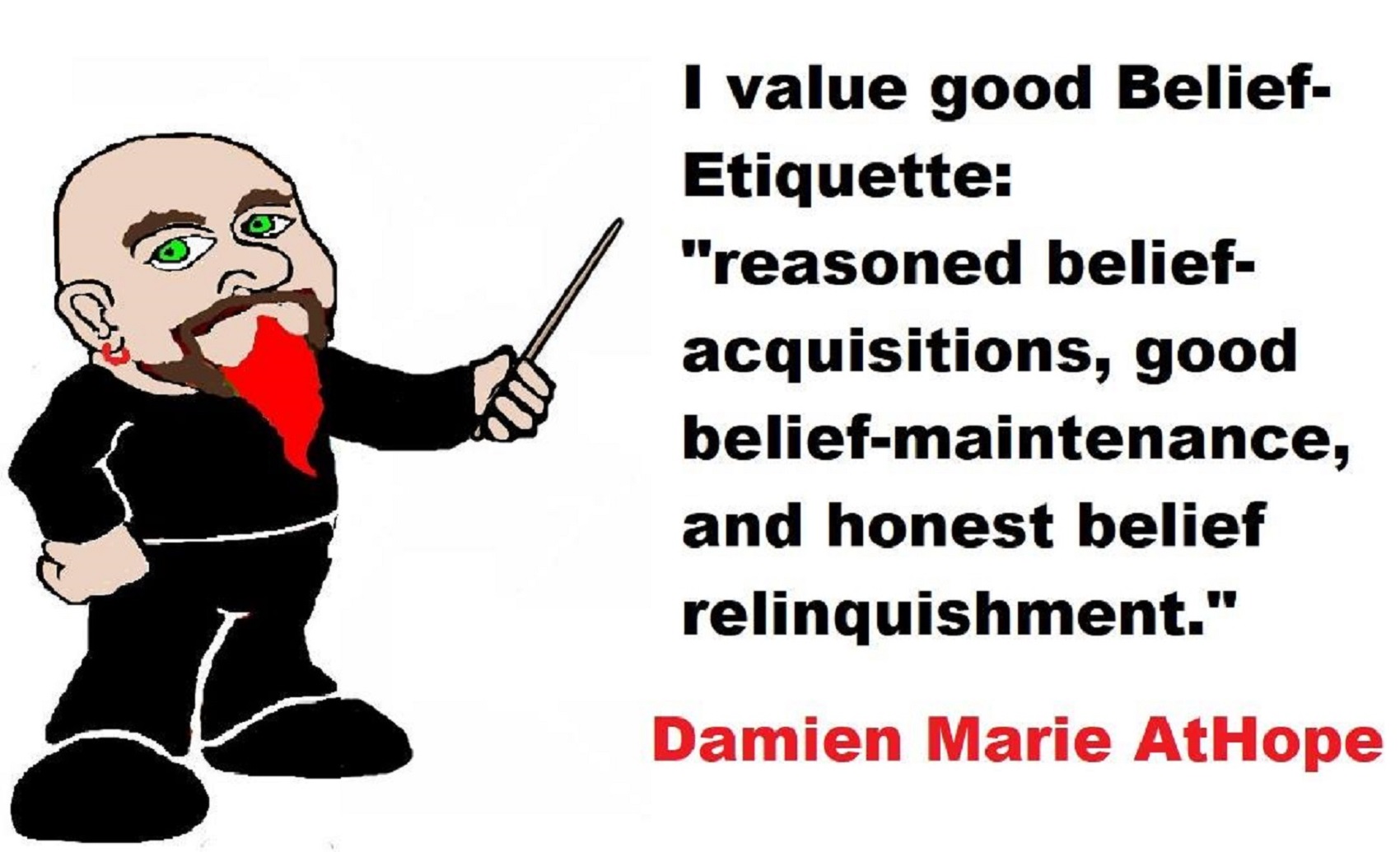
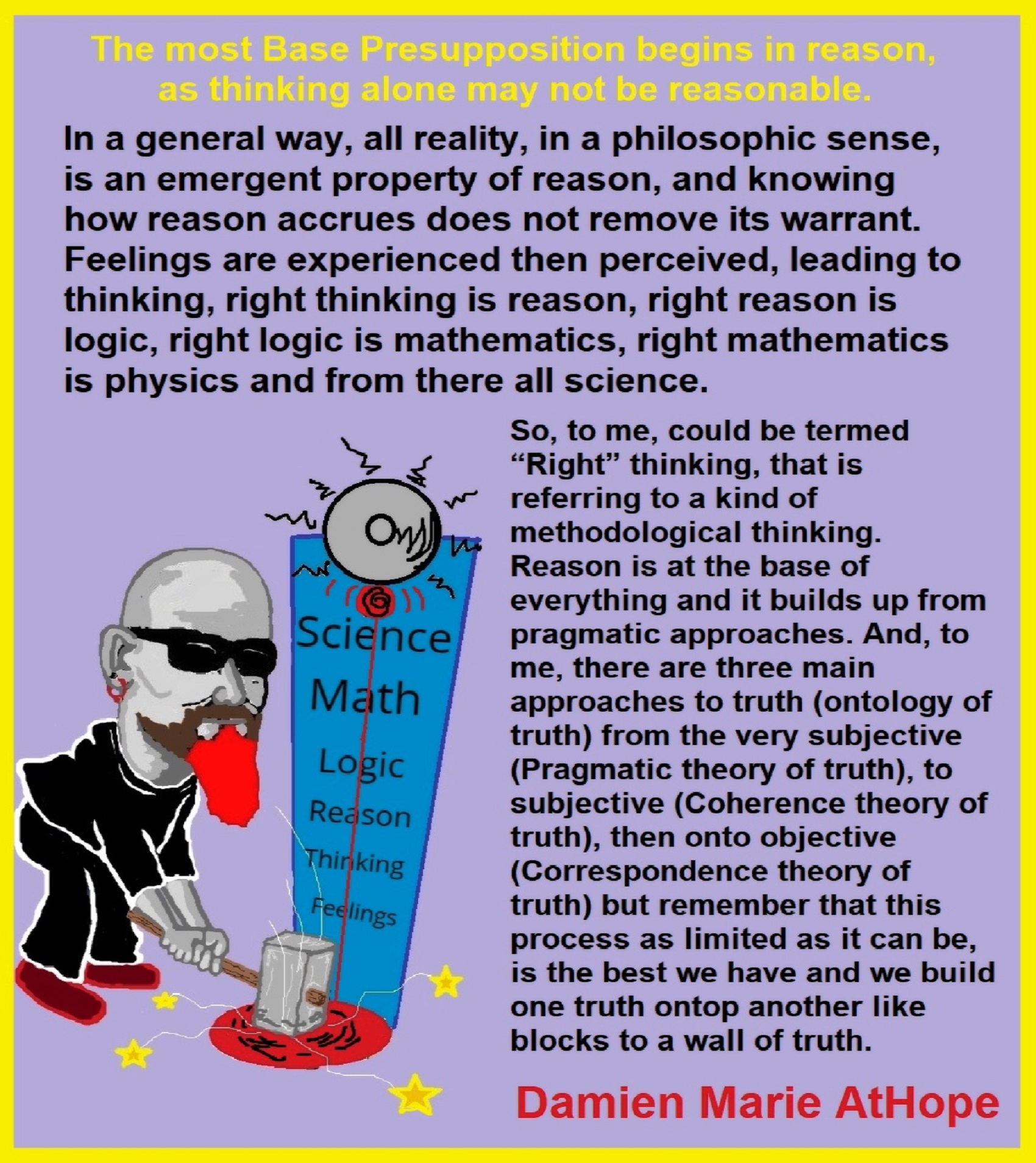
My brother, it seems to me, thinks, we start in doubt or extreme uncertainty, or some solipsistic Skepticism, and he kind of get lost there, he is not sure reality is real, then just assume life is real, all the while in uncertainty, and lives life as a skeptic thinker. I tried to explain stuff how I have helped him many times think differently. I was atheist first in my family, then my talking to my brother showing him “Reason,” he turned skeptic as a Christian, then agnostic, and then skeptic atheist.
I don’t like that kind of Naive/Limiting Skepticism
“Damien, I’m sympathetic to his view to a certain extent but also we have a kind of built-in understanding that other beings have experiences separate from us and are whole entities. Nearly everyone has this understating even animal.” – Cory Johnston: The Mind of a Skeptical Leftist
“As an epistemological position, solipsism holds that knowledge of anything outside one’s own mind is unsure; the external world and other minds cannot be known and might not exist outside the mind. There are varying degrees of solipsism that parallel the varying degrees of skepticism.” ref
As an Axiologist (value theorist) philosopher, not just a rationalist, I keep trying to point out people’s fallacies of black and white thinking, because often, most things, are in varying degrees. People overgeneralize thus stay confused by degrees of solipsism to where they don’t seem to reach the greatness of reason. “Reason” is the key to it all. Our safe and sure foundation with witch to erect our thinking architecture allowing epistemic confidence in our justified true beliefs.
“In the social sciences, value theory involves various approaches that examine how, why, and to what degree humans value things and whether the object or subject of valuing is a person, idea, object, or anything else. Within philosophy, it is also known as ethics or axiology. Traditionally, philosophical investigations in value theory have sought to understand the concept of “the good“. Today, some work in value theory has trended more towards empirical sciences, recording what people do value and attempting to understand why they value it in the context of psychology, sociology, and economics.” ref
The “Free Will” Debate
To me, we have a “will” that is lesser or greater all the time, not really “free will” as some think and that does not remove how in a general way, we tend to have something close to free will. Think if we had true “free will” we would never be limited by influences such as environments, or our fight-or-flight response, or our tend and befriend behaviors. We do not start the world as blank slates, nor does it take long to recognize the beginnings of morality in humans, we see it is babies at around a few months old not after they learn religion nor any philosophy. I see our ebbing and flowing will, one that at times we feel 100% free of will does not equal a mind 100% free-thinking devoid of any basis when we know such thinking errors are the rule, not an unlikely accident. Choose wisely.
I see our will as at times possibly close to what people think of as free will. But such a time is not fixed or lasting and ranges up and down during the day and is in no way actually regulated. As in think of the moment you hear of a crushing loss, could you make truly clear-headed moral reasoned decisions? I do not know about you, but I likely could error being so emotionally hijacked in my thinking. I believe generally most can but there is not just one thinking state nor is simple awareness the came as a critical reflection over days on one idea. is just swimming in our cognitive motivations stemming from both external and external influences thus we are not as free as we believe but yes, we have some “will”, I do not know if free is the best word as it could give a wrong impression or exaggerated explanation and maybe why there is all the confusion.
I am not trying to just push one thinking without thinking, rather I seek to desire truth even if it is being spoken from the mouths of others. I strive to be a free thinker with only reason as my master and humanity in my heart. May I use all the will I have to be the best me I can be, may I be a good human. To me, we are responsible to do what is of value. not ego, not pride, not self-dealing, but genuinely embody a heart of kindness, one that breathes deep a care for humanity. When we stop focusing our great minds on better ways to kill, we can focus on ideas that heal.
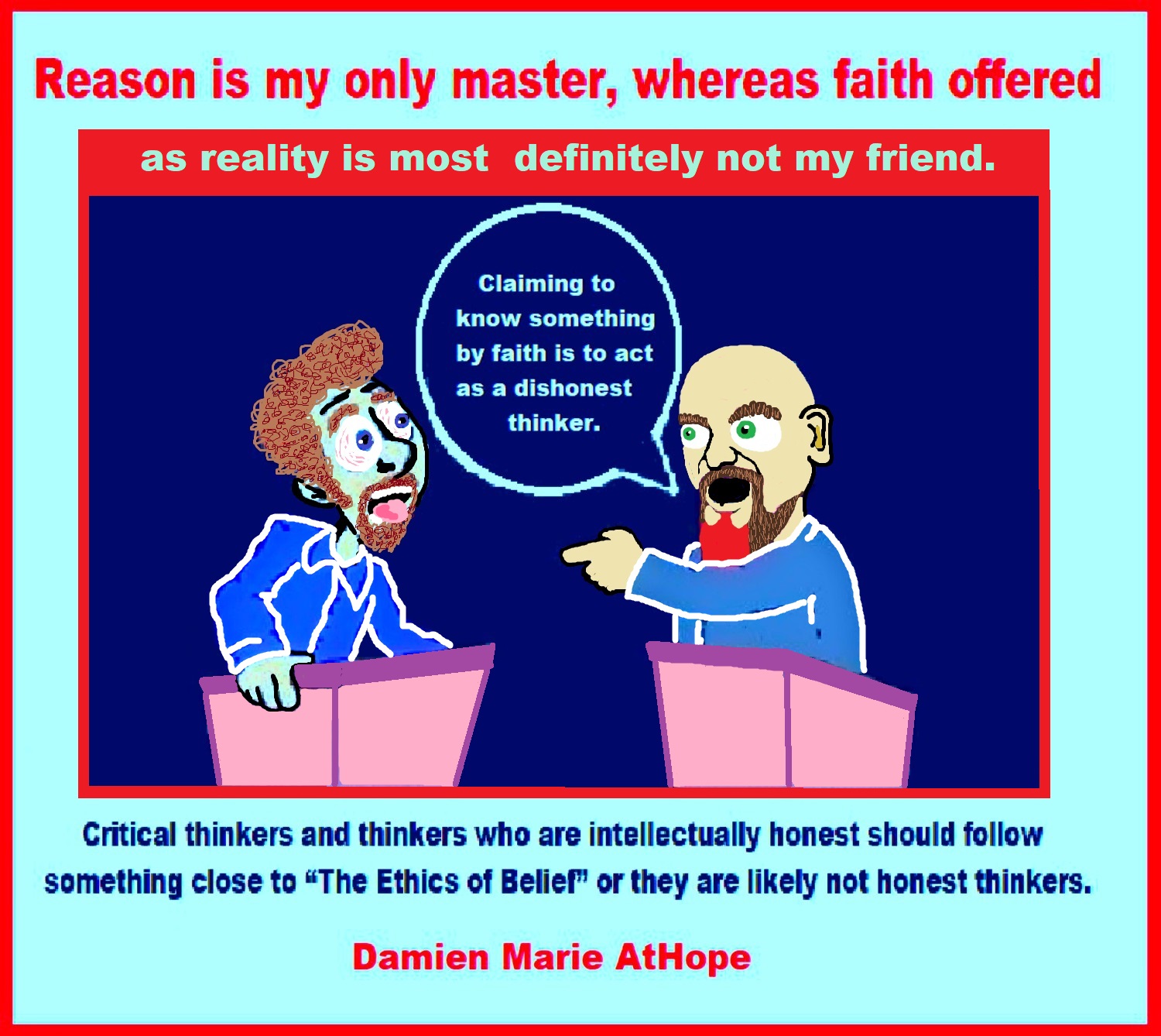
I want to clarify that I am an an Ignostic, Axiological Atheist and Rationalist who uses methodological skepticism. I hold that there is valid and reliable reason and evidence to warrant justified true belief in the knowledge of the reality of external world and even if some think we don’t we do have axiological and ethical reasons to believe or act as if so.
Thinking is occurring and it is both accessible as well as guided by what feels like me; thus, it is rational to assume I have a thinking mind, so, I exist.
But, some skeptics challenge reality or certainty (although are themselves appealing to reason or rationality that it self they seem to accept almost a priori themselves to me). Brain in a vat or jar, Evil Demon in your mind, Matrix world as your mind, & Hologram world as your reality are some arguments in the denial or challenge of reality or certainty.
The use of “Brain in a vat” type thought experiment scenarios are common as an argument for philosophical skepticism and solipsism, against rationalism and empiricism or any belief in the external world’s existence.
Such thought experiment arguments do have a value are with the positive intent to draw out certain features or remove unreasoned certainty in our ideas of knowledge, reality, truth, mind, and meaning. However, these are only valuable as though challenges to remember the need to employ Disciplined-Rationality and the ethics of belief, not to take these thought experiment arguments as actual reality. Brain in a vat/jar, Evil Demon, Matrix world, and Hologram world are logical fallacies if assumed as reality representations.
*First is the problem that they make is a challenge (alternative hypotheses) thus requiring their own burden of proof if they are to be seen as real.
*Second is the problem that they make in the act of presupposition in that they presuppose the reality of a real-world with factual tangible things like Brains and that such real things as human brains have actual cognition and that there are real-world things like vats or jars and computers invented by human beings with human real-world intelligence and will to create them and use them for intellectually meaningful purposes.
*Third is the problem of valid and reliable slandered as doubt is an intellectual professes needing to offer a valid and reliable slandered to who, what, why, and how they are proposing Philosophical Skepticism, Solipsism and the Denial of Reality or Certainty. Though one cannot on one had say I doubt everything and not doubt even that. One cannot say nothing can be known for certain, as they violate this very thought, as they are certain there is no certainty. The ability to think of reasonable doubt (methodological Skepticism) counteracts the thinking of unreasonable doubt (Philosophical Skepticism’s external world doubt and Solipsism). Philosophical skepticism is a method of reasoning which questions the possibility of knowledge is different than methodological skepticism is a method of reasoning, which questions knowledge claims with the goal finding what has warrant, justification to validate the truth or false status of beliefs or propositions.
*Fourth is the problem that external world doubt and Solipsism creates issues of reproducibility, details, and extravagancy. Reproducibility such as seen in experiments, observation and real-world evidence, scientific knowledge, scientific laws, and scientific theories. Details such as the extent of information to be contained in one mind such as trillions of facts and definable data and/or evidence. And extravagancy such as seen in the unreasonable amount of details in general and how that also brings the added strain to reproducibility and memorability. Extravagancy in the unreasonable amount of details also interacts with axiological and ethical reasoning such as why if there is no real-world would you create rape, torture, or suffering of almost unlimited variations. Why not just rape but child rape, not just torture but that of innocent children who would add that and the thousands of ways it can and does happen in the external world. Extravagancy is unreasonable, why a massive of cancers and infectious things, millions of ways to be harmed, suffer and die etc. There is a massive amount of extravagancy in infectious agents if the external world was make-believe because of infectious agents come in an unbelievable variety of shapes, sizes, and types like bacteria, viruses, fungi, protozoa, and parasites. Therefore, the various types of pleasure and pain both seem an unreasonable extravagancy in a fake external world, therefore, the most reasonable conclusion is the external world is a justified true belief.
*Fifth is the problem that axiological or ethical thinking would say we only have what we understand and must curtail behavior ethically to such understanding. Think of ability to give consent having that reasoning ability brings with it the requirement of being responsible for our behaviors. If one believes the external world is not real, they remove any value (axiology) in people, places or things, and if the external world is not real there is no behavior or things to interact with (ethics) so nothing can be helped or harmed by actions as there is no actions or ones acting them or having them acting for or against. In addition, if we do not know is we are actually existing or behaving in the real world we also are not certain we are not either, demanding that we must act as if it is real (pragmatically) due to ethical and axiological concerns which could be true. Because if we do act ethically and the reality of the external world is untrue we have done nothing but if we act unethical as if the reality of the external world is untrue and it is in fact real we have done something to violate ethics. Then the only right way to navigate the ethics of belief in such matters would say one should behave as though the external world is real. In addition, axiological or ethical thinking and the cost-benefit analysis of belief in the existence of the external world support and highly favors belief in the external world’s existence.
Solipsism (from Latin solus, meaning “alone”, and ipse, meaning “self”) is the philosophical idea that only one’s own mind is sure to exist. To me, solipsism is trying to limit itself to rationalism only to, of, or by itself. Everyone, including a Solipsist, as the mind to which all possible knowledge flows; consider this, if you think you can reject rational thinking as the base of everything, what other standard can you champion that does not at its core return to the process of mind as we do classify people by intelligence. If you cannot use rationalism what does this mean, irrationalism? A Solipsist, is appealing to rationalism as we only have our mind or the minds of others to help navigate the world accurately as possible. 1
According to Peter Klein at the Stanford Encyclopedia of Philosophy, Philosophical skeptic challenges our ordinary assumption that there is evidence available that can help us to discriminate between the real world and some counterfeit world that appears in all ways to be identical to the real world. Ordinary incredulity arises within the context of other propositions of a similar sort taken to be known, and, in principle, the doubt can be removed by discovering the truth of some further proposition of the relevant type. On the other hand, philosophical skepticism about a proposition of a certain type derives from considerations that are such that they cannot be removed by appealing to additional propositions of that type—or so the skeptic claims. These movies illustrate one other fundamental feature of the philosophical arguments for skepticism, namely, that the debate between the skeptics and their opponents takes place within the evidentialist account of knowledge which holds that knowledge is at least true, sufficiently justified belief. The debate is over whether the grounds are such that they can make a belief sufficiently justified so that a responsible epistemic agent is entitled to assent to the proposition. The basic issue at stake is whether the justification condition of knowledge can be fulfilled. A corollary of this is that strictly reliabilist or externalist responses to philosophical skepticism constitute a change of subject. A belief could be reliably produced, i.e., its causal pedigree could be such that anything having that causal etiology is sufficiently likely to be true, but the reasons available for it could fail to satisfy the standards agreed upon by both the skeptics and their opponents. http://plato.stanford.edu/entries/skepticism/
“For the record: Quantum mechanics does not deny the existence of objective reality. Nor does it imply that mere thoughts can change external events. Effects still require causes, so if you want to change the universe, you need to act on it.” – Lawrence M. Krauss
Epistemology Confusion?
Skeptics think they are more clever than me an astute rationalist, with claims such as, because we distrust our senses we therefore somehow can’t use them to know if we exist but fear not my friends as all is not lost. Just saying something has a random nature is not an evidence clam it lacks all value. lol
Scientific Values: fallidilism, realism, & rationalism
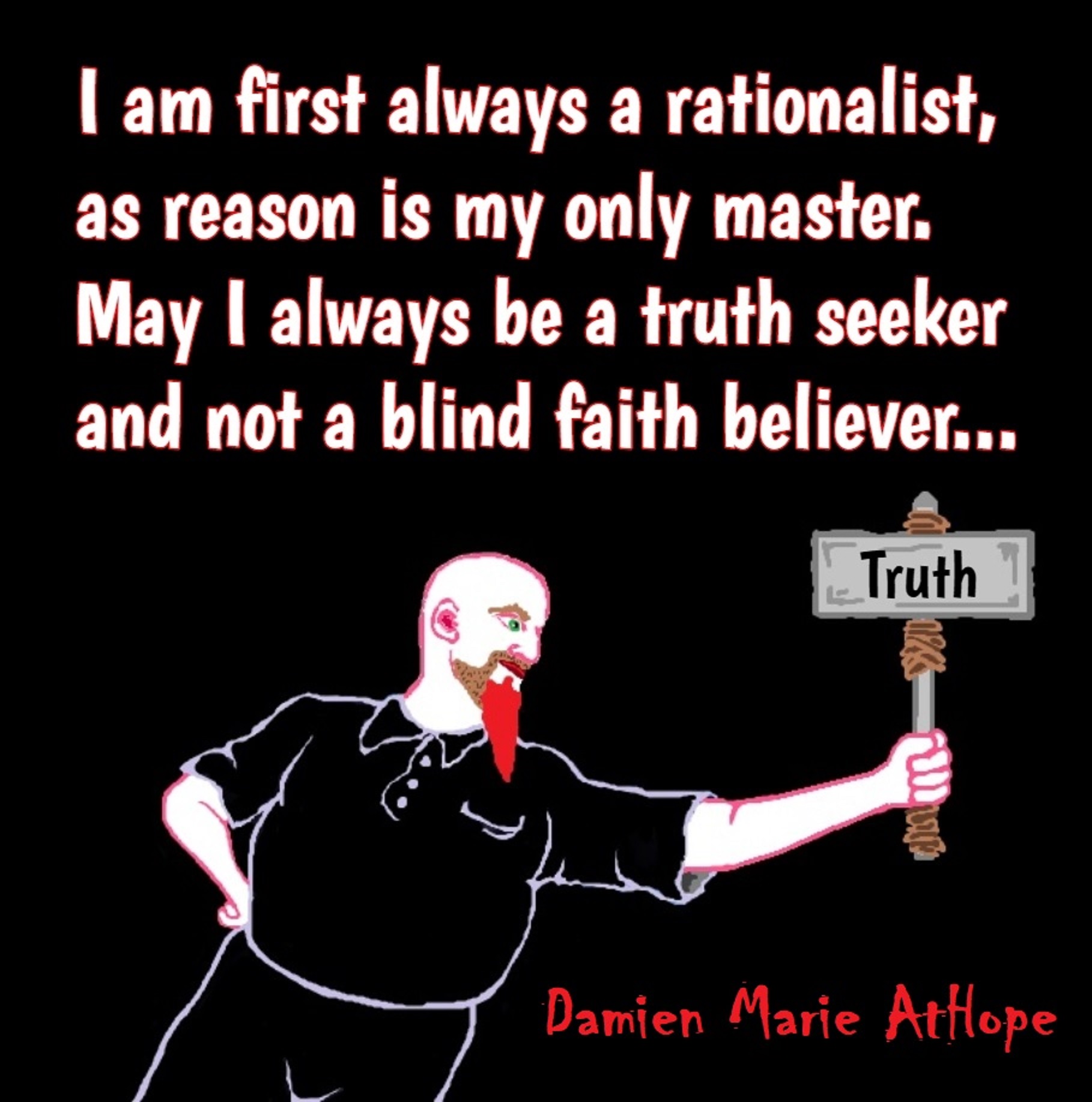
I need others to see, how I see differently, not just realize, the difference.
Others may still think differently but they will accurately grasp my type of thinking.
“Axiology (from Greek ἀξία, axia: “value, worth”; and -λογία, -logia: “study of”) is the philosophical study of value. It includes questions about the nature and classification of values and about what kinds of things have value. It is intimately connected with various other philosophical fields that crucially depend on the notion of value, like ethics, aesthetics, or philosophy of religion. It is also closely related to value theory and meta-ethics. The term was first used by Paul Lapie, in 1902, and Eduard von Hartmann, in 1908.” ref
“The distinction between intrinsic and extrinsic value is central to axiology: something is intrinsically valuable if it is good in itself or good for its own sake. It is usually held that intrinsic value depends on certain features of the valuable entity. For example, an experience may be said to be intrinsically valuable in virtue of being pleasurable. Extrinsic value, by contrast, is ascribed to things that are valuable only as a means to something else. Substantive theories of value try to determine which entities have intrinsic value.” ref
“Monist theories hold that there is only one type of intrinsic value. The paradigm example of monist theories is hedonism, the thesis that only pleasure has intrinsic value. Pluralist theories, on the other hand, contend that there are various different types of intrinsic value, for example, virtue, knowledge, friendship, etc. Value pluralists face the problem of explaining whether or how the different types of value can be compared when making rational decisions. Some philosophers state that values do not exist on the most fundamental level of reality. One such view holds that a value statement about something just expresses the speaker’s approval or disapproval of this thing. This position is opposed by realists about value.” ref
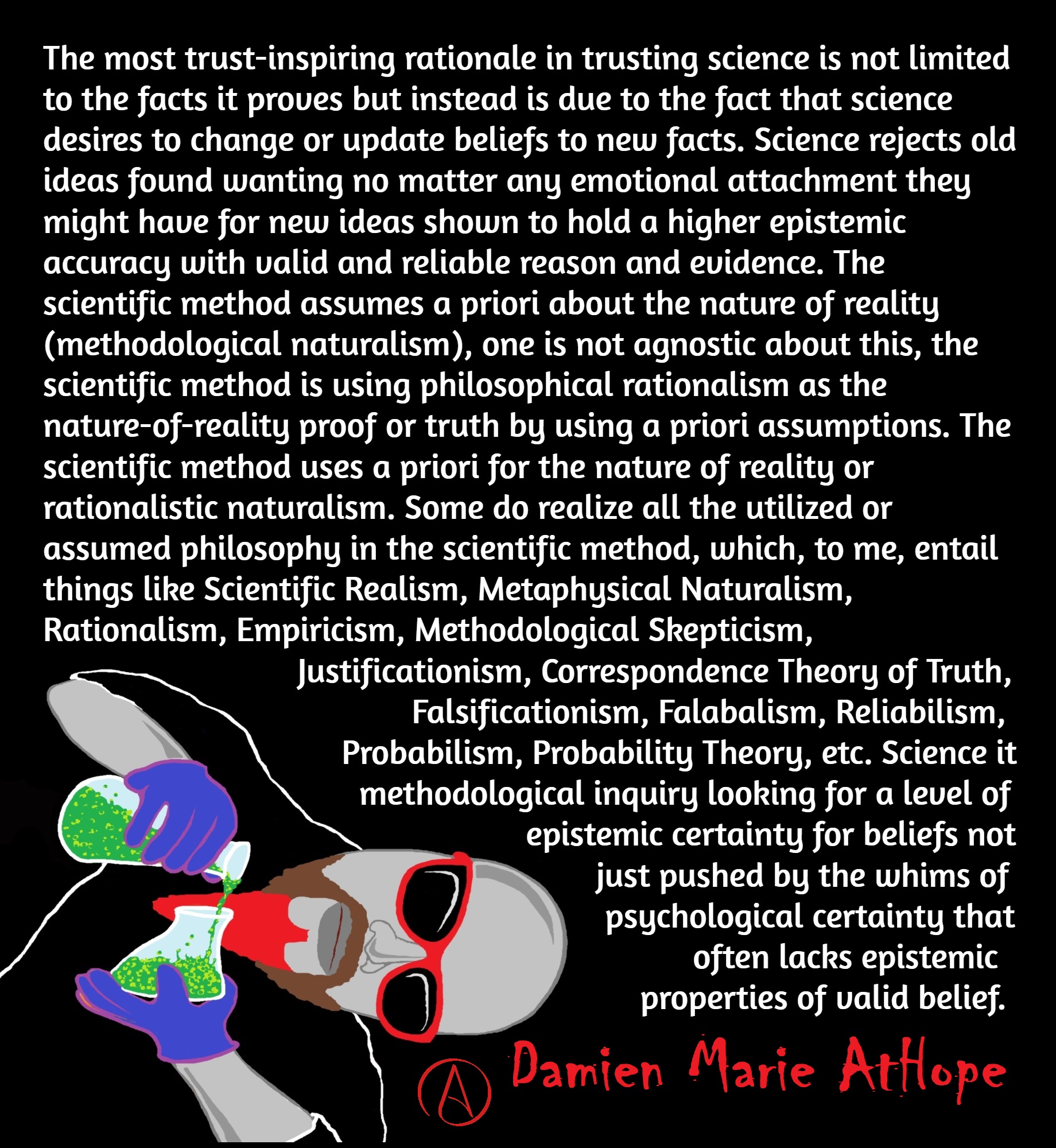
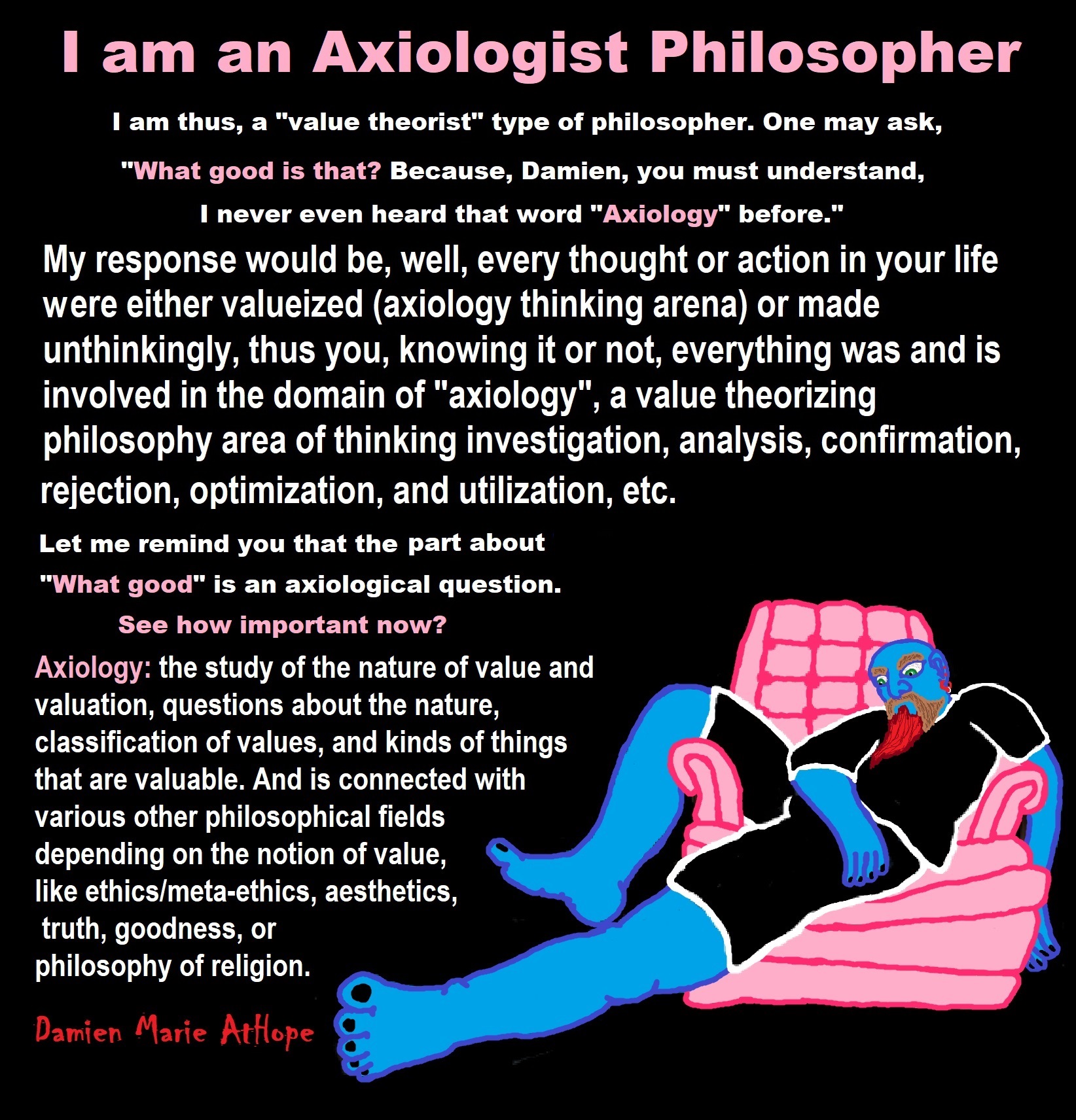
I am a Methodological Rationalist, I rarely am pushed to doubt as a default, instead, I see reason as my default and at times it may be responsible to doubt, but I get to that conclusion because of reasoning. A common saying in pseudologic is “You can’t prove a negative.” This is, simply not true. This is clearly not true because any statement can be rewritten into the negation of its negation. Any provable statement can be written as a negative. For example, “X is true” can be rewritten as “X is not false”, a negative statement! If “X is true” can be proven true, then you have also proven a negative statement “X is not false”. Moreover, even if it is widely believed that you can’t prove a negative. Going so far as to have people thinking that it is a law of logic—you can’t prove that Santa Claus, unicorns, the Loch Ness Monster, God, pink elephants, WMD in Iraq, and Bigfoot don’t exist. This widespread belief is flatly, 100% wrong. In this little essay, I show precisely how one can prove a negative, to the same extent that one can prove anything at all. Evidence of absence is evidence of any kind that suggests something is missing or that it does not exist. Per the traditional aphorism, “absence of evidence is not evidence of absence”, positive evidence of this kind is distinct from a lack of evidence or ignorance of that which should have been found already, had it existed. In this regard, Irving Copi writes: “In some circumstances, it can be safely assumed that if a certain event had occurred, evidence of it could be discovered by qualified investigators. In such circumstances, it is perfectly reasonable to take the absence of proof of its occurrence as positive proof of its non-occurrence.” — Copi, Introduction to Logic (1953), p. 95
Thinking is good and one claiming otherwise is indeed a person erroring in reason. Which may I remind you is terrible since the most Base Presupposition in our understanding of everything begins in reason.
So, remember to me, right thinking is reason. Right-reason (Sound reasoning) is logic. Right logic, can be used for mathematics, and from there we can get to science. And, by this methodological approach, we get one of the best ways of knowing the scientific method. Activating experience/event occurs, eliciting our feelings/scenes. Then naive thoughts occur, eliciting emotions as a response. Then it is our emotional intelligence over emotional hijacking, which entrance us but are unavoidable, and that it is the navigating this successfully in a methodological way we call critical thinking or as In just call right thinking. So, to me, could be termed “Right” thinking, that is referring to a kind of methodological thinking. Reason is at the base of everything and it builds up from pragmatic approaches. And, to me, there are three main approaches to truth (ontology of truth) from the very subjective (Pragmatic theory of truth), to subjective (Coherence theory of truth), then onto objective (Correspondence theory of truth) but remember that this process as limited as it can be, is the best we have and we build one truth ontop another like blocks to a wall of truth.
Soundness
“In logic, more precisely in deductive reasoning, an argument is sound if it is both valid in form and its premises are true. Soundness also has a related meaning in mathematical logic, wherein logical systems are sound if and only if every formula that can be proved in the system is logically valid with respect to the semantics of the system. In deductive reasoning, a sound argument is an argument that is both valid, and all of whose premises are true (and as a consequence its conclusion is true as well). An argument is valid if, assuming its premises are true, the conclusion must be true.” ref
An example of a sound argument is the following well-known syllogism:
“All men are mortal. Socrates is a man. Therefore, Socrates is mortal.” Because of the logical necessity of the conclusion, this argument is valid; and because the argument is valid and its premises are true, the argument is sound. However, an argument can be valid without being sound. For example: “All birds can fly. Penguins are birds. Therefore, penguins can fly.” This argument is valid because, assuming the premises are true, the conclusion must be true. However, the first premise is false. Not all birds can fly (penguins, ostriches, kiwis etc.) For an argument to be sound, the argument must be valid and its premises must be true.” ref
The soundness of a deductive system is the property that any sentence that is provable in that deductive system is also true on all interpretations or structures of the semantic theory for the language upon which that theory is based. In symbols, where S is the deductive system, L the language together with its semantic theory, and P a sentence of L: if ⊢S P, then also ⊨L P.” ref
Strong soundness
“Strong soundness of a deductive system is the property that any sentence P of the language upon which the deductive system is based that is derivable from a set Γ of sentences of that language is also a logical consequence of that set, in the sense that any model that makes all members of Γ true will also make P true. In symbols where Γ is a set of sentences of L: if Γ ⊢S P, then also Γ ⊨L P. Notice that in the statement of strong soundness, when Γ is empty, we have the statement of weak soundness.” ref
Pragmatic theory of truth, Coherence theory of truth, and Correspondence theory of truth
In a general way, all reality, in a philosophic sense, is an emergent property of reason, and knowing how reason accrues does not remove its warrant. Feelings are experienced then perceived, leading to thinking, right thinking is reason, right reason is logic, right logic is mathematics, right mathematics is physics and from there all science.
Right-(SOUND)-Reason: is reasoning to the highest soundness available.
Science is quite the opposite of just common sense. To me, common sense is experience-related interpretation, relatively, as it generally relates to the reality of things in the world, which involves “naïve realism” as well as possible psychological certainty and low epistemic certainty. Whereas, most of those who are scientific thinkers, hold typically more to scientific realism or other stances far removed from the limited common sense of naive realism. Science is a multidisciplinary methodological quest for truth. Science understands what is, while religion is wishing on what is not. Scientific realism sees external reality as described by science is what is REAL and thus TRUE with the highest epistemic certainty regardless of possible psychological certainty.
Getting Real with Logic
Logic is the result of rationalism, as what do you think gets you to logic if not starting at reason? I want to hear your justification for your claims, all the presuppositions you are evading to explain the links in your claims of truth. As it is invalid to just claim this without a justification for your professed claims and the presupposing you do to get there, that is not trying to use rationalism to refuse rationalist thinking. How are you making the statement and not appearing to what is the rationale behind it? If not, you must want to think “Logic is self-generating as valid” and this understood value is to you not reducible to reason? You are devoid of an offer of your burden of proof, first just try to keep up with the thinker’s responsibility to provide more than unjustified claims. Logic is derived by axioms and thus using rationalism to validate them, think otherwise provide your proof. My Rationalism: is two things externalistic “scientific rationalism” a belief or theory that opinions and actions should be based on reason and knowledge rather than on religious belief or emotional response. And internalistic “philosophic rationalism” the theory that reason is the most base presupposition before all others, rather than simply trying to rely on experience is the foundation of certainty in knowledge. Activating experience occurs we then have thinking, right (methodological) thinking (critical thinking) is reason, right reason is logic, right logic can be used for math, right math in response to the natural world is physics, and from there all other Sciences, physics is the foundation for chemistry and chemistry is the foundation of biology. May Right-(SOUND)-Reason be your only master and may you also master reason.
Religion vs. Science, Don’t Confuse Beliefs
A basic outline of scientific epistemology:
Science: Hypotheses (Rationalism/Deductive, Inductive, or Abductive Reasoning etc.) + Testing (Empiricism/Systematic Observation) – Checking for errors (Skepticism/Fallibilism) + Interpret/Draw a Conclusion (Rationalism/Deductive, Inductive, or Abductive Reasoning etc.) *if valid* = Scientific Laws (describes observed phenomena) or Scientific Theory (substantiated and repeatedly tested explanation of phenomena) = Justified True Belief = Scientific Knowledge = Epistemic Certainty supportive of correctability
*being epistemically certain, is believing a truth has the highest epistemic status, often with warranted psychological certainty but it may not, neither is it a requirement*
“Damien, I have a question: Who/what gives humans value?”
My response, We give value, as value is an awareness and judgment, it is an emergent property of validation; the ability to use critical thinking and logic in a useful way, to conclude worth, benefit, or good.
I am the “one” you have been waiting for. I am will to power, a deep thought so true it has taken flight to the lofty aspirations dreamed for and a care transmitted to offer hope to humanity. I believe in you and will strive to champion you with all I have for you are so worthy… I am that freak of nature, a power from the anti-power crusaders, warring against the power dynamic to return it back where it belongs- the hands of the people. I am a free-thinking invader into the shell of malignancy infecting humanity which strangles reason out of the world. A proud anarchy theorist, I breathe the fire of the heathens, a thought revolutionary and mental freedom fighter. I am a humanist atheist who desires a better world for us all, one that is kinder, more just, and more rational in its pursuits.
I am a “Scientific Axiology” minded “Philosophic Axiologist.”
*Philosophic Axiology (Value Theory)
*Scientific Axiology (Formal Axiology)
Axiological atheism can be thought to involve ethical/value theory reasoned and moral argument-driven apatheism, ignosticism, atheism, anti-theism, anti-religionism, secularism, and humanism. The valuations move up the latter as the levels of evaluation is made to value judge all the elements to better understand the value or disvalue available to reach the most accurate valuation reasonable with a sound aware value conciseness. Axiological atheism can be thought to involve Ethical Atheism. Below shows the 7 axiological atheism argument flow to show the value layers and my thoughts on it:
1. Apatheism: starts at real, we are born and by the fact reality is devoid of magic removes theological desires to understand the obvious naturalistic world, until we learn otherwise. (a “presumptive-value” failure, thus no motivation to adequately start the evaluation needed to understand if there is real value for an Axiology assessment to accurately place it in the value hierarchy). = no value
2. Ignosticism: sees theological arguments and language as equivocation, contradictory, and/or un-cognitively relatable other than emotionalism or the like. I see Ignosticism as using the Theological non-cognitivism arguments of “mind understanding issues” (rationalism challenging) and an evidentialist/verificationist arguments of “lacking evidence issues” (empiricism challenging). As an atheist, I am a person who disbelieves or lacks belief in the existence of god or gods. In my non-belief, I am also ignostic feeling that every theological position assumes too much about the concept of god(s). As an ignostic, I am a person who rational no idea of anything from reality whatever to label as “a concept of god” thus I can say I have no idea of anything that can connect to the term god and no reason to think anyone else can either. (again a “presumptive-value” failure, no good Ontology of the thing for Identifying values that could influence belief but without what is needed to understand if there is real value for an axiology assessment to accurately place it in the value hierarchy). = no value
3. Atheism: How can we not reject the concept of gods, aka: supposed supreme magical beings, when not even some simple magic is supported in reality. So how then is it not even more ridiculous to claim some supreme magic aka: gods which are even further from reality. May I remind you that faith in the acquisition of knowledge is not a valid method worth believing in. Because, what proof is “faith”, of anything religion claims by faith, as many people have different faith even in the same religion? As an atheist, I am a person who disbelieves or lacks belief in the existence of god or gods. In my non-belief, I am also ignostic feeling that every theological position assumes too much about the concept of god(s). As an ignostic, I am a person who rational no idea of anything from reality whatever to label as “a concept of god” thus I can say I have no idea of anything that can connect to the term god and no reason to think anyone else can either. Atheists talk about gods and religions for the same reason doctors talk about cancer, they are looking for a cure or a firefighter talking about fires because they burn people and they care to stop them. We atheists too often feel a need to help the victim’s of mental slavery, held in the bondage that is the false beliefs of gods and the conspiracy theories of reality found in religions. If you think you believe in a god, “what do you mean by god,” saying a name tells me not one thing about the thing I am asking to know “its” beingness / thingness / attributes / qualities. Thus, what is the thing “god” to which you are talking about and I want you to explain its beingness /thingness / attributes/ qualities? Religious/theistic people with supernatural beliefs often seem as though they haven’t thought much about and that is something we can help using ontology questions about the beingness / thingness / attributes/ qualities they are trying to refer too. What do you mean by god, when you use the term god? And, I am not asking you for the name you attach to the thing you label as a god. I don’t need to know what the god you believe is known “by.” I am asking, what is the thing you are naming as a god and what that thing is, its qualities in every detail like all things have if they are real. Are you just making stuff up or guessing/hoping or just promoting unjustified ideas you want to believe, what is a god? As an atheist, I feel more wonder than I did as a theist because I thought, “big deal” to any wonder I experienced, thinking god could do anything. So with such an unrealistic mindset, everything lost its wonder but it’s the opposite as an atheist. As a theist, the world was full of superstitions and supernatural magic possibilities and thus utilized thinking that was not in the real world. As an atheist all I have now is the real world, not that all atheists seem to get this, we all are in a real world devoid of magic anything, therefore, everything adds to my feeling of awe. There should be little debate with atheist acknowledging discernable reality compared to theists with non-reality claims. Yes, I have way more awe and wonder as an atheist than I ever had as a theist because as a theist anything was possible with god. Therefore, as a theist things where not that amazing. However, as an atheist grasping what an absolute accidental or how random things are, with a 95 to 99 % of all life ever existing on this planet went extinct. I am thoroughly amazed we are even here the evolved children of ancient exploded stars, likely born in galaxies born in super-massive black holes, it’s all amazing. There is no evidence for Gods. But is their proposition outside of reason? As always start in reality from the evidence we do know, such as never in the history of scientific research or investigation has any supernatural claims shown to be true. So it is completely outside of possibility and is utterly ridiculous. Therefore, belief should be rejected as there are no warrants at all and it is axiologically unworthy to such a preponderance to demand disbelief. (yet again a “presumptive value” failure, no good Ontology of the thing not the cognitively meaningful claims relatable to reality that must be attached to all magic and gods claims for Identifying values that could influence belief but without what is needed to understand if there is real value for an axiology assessment to accurately place it in the value hierarchy).
4. Antitheism: Anti-theism requires more than either merely disbelieving in gods or even denying the existence of gods. Anti-theism requires a couple of specific and additional beliefs: first, that theism is harmful to the believer, harmful to society, harmful to politics, harmful, to culture, etc.; second, that theism can and should be countered in order to reduce the harm it causes. If a person believes these things, then they will likely be an anti-theist who works against theism by arguing that it be abandoned, promoting alternatives, or perhaps even supporting measures to suppress it. It’s worth noting here that, however, unlikely it may be in practice, it’s possible in theory for a theist to be an anti-theist.This may sound bizarre at first, but remember that some people have argued in favor of promoting false beliefs if they are socially useful. To me, I think many may have a misconception of the term. Atheism and anti-theism so often occur together at the same time and in the same person that it’s understandable if many individuals fail to realize that they aren’t the same. Making a note of the difference is important, however, because not every atheist is anti-theistic and even those who are, aren’t anti-theistic all the time. Atheism is simply the absence of belief in gods; anti-theism is a conscious and deliberate opposition to theism.Many atheists are also anti-theists, but not all and not always. To me as an antitheist, I see the concept of gods antihumanistic and wholly harmful to a free humanity and if the so-called gods somehow do end up being real that I will switch to direct opposition as I would any tyrant oppressing humanity. Antitheism (sometimes anti-theism) is a term used to describe an opposition to theism. The term has had a range of applications and definitions. In secular contexts, it typically refers to direct opposition to the validity of theism, but not necessarily to the existence of a deity. As an anti-theist, I am a person who is active in opposition to theism: both the concepts of god(s) as well as the religions that support them.This is because theistic concepts and theistic religions are harmful and that even if theistic beliefs were true, they would be undesirable. (And, again a “presumptive value” failure, of the other value challenges of the lesser evaluations and value judgments addressed in the apatheism, ignosticism, atheism value judgment conclusion and an Axiological Atheism assessment of the god concept that must be attached to all magic and gods claims Identifying a lack of value and/or disvalue that influence harm to real value in an axiology assessment to accurately place its value violations in the value hierarchy).
5. Antireligionism: Not just Atheist, axiological atheists should be antitheists but this generally will involve anti-religionism. it would generally thus hold anti-religionist thinking. Especially, I am an anti-religionist, not just an atheist, and here is why summed up in three ideas I am against. And, in which these three things are common in all religions: “pseudo-science”, “pseudo-history”, and “pseudo-morality”. And my biggest thing of all is the widespread forced indoctrination of children, violating their free choice of what to not believe or believe, I hate forced hereditary religion. And my biggest thing of all is the widespread forced indoctrination of children, violating their free choice of what to not believe or believe, I hate forced hereditary religion. As well as wish to offer strong critiques regarding the pseudo-meaning of the “three letter noise” people call “G.o.d” (group originated delusion)!As an anti-religionist, I am a person who can look at religion on the whole and see it is detrimental to the progress of humanity thus am in opposition to all and every religion, not even just opposition to organized religion. In case you were wondering, I am anti-pseudoscience, anti-supernatural, and anti-superstition as well. May I not be a silent watcher as millions of children are subjugated almost before their birth let alone when they can understand thought and are forcibly coerced, compelled, constrained, and indoctrinated in the mental pollution that religion can be. My main goal against religion is to fully stop as much as possible forced indoctrination, one could ask but then why do I challenge all adults faith?Well, who do you think is doing the lying to children in the first place. End Hereditary religion, if its a belief let them the equal right to choose to believe. “Religion is an Evolved Product” and Yes, Religion is Like Fear Given Wings… (And, one last time a “presumptive value” failure, of the other value challenges of the lesser evaluations and value judgments addressed in the apatheism, ignosticism, atheism value judgment conclusion and an Axiological Atheism assessment of the god concept and anti-theism assessment of the god show not just a lack of value but a possibly or likely harm demonstrating bot just a lack of value but a real disvalue and that includes the religions potentially removing value in an axiology assessment to accurately place it in the value hierarchy).
6. Secularism: is the only honorable way to value the dignity of others. If it was not true that there is a large unequal distribution of religion contributing to violence then there would be equal religion and atheist secularism violence. You do not see atheists bombing agnostics the very idea is laughable however even different branches of the same religion do will and have killed one another. So, violence not who we are it’s something we need to be compelled to do. Therefore, please support secularism. We are all one connected human family, proven by DNA showing we should treat each other as fellow dignity beings, supported equally (no gods and no masters). States may often have powers, but only citizens have the glue of morality we call rights. And, as they say, in my “dream society”, lots of things are free (aka. planting free food everywhere, free to everyone); but I wonder what you mean when people say you can’t just let things be free, I think, yeah, how can I take free stuff from a free earth.If one observes the virtues of (T. R. U. E. “The Rational Universal Ethics” or “The Responsible Universal Ethics”) that connect to all things as that of the connectedness equality like those which mirror the rays of the sun, fall down equally with a blind but fair indifference. (what is being expressed is that this sun shining will not favor one over another, no, the same upon everyone offering its light to all plant, animal, human, women, men, single or married, homosexual, bisexual, heterosexual, nonreligious, religious, people of means and those without, able-bodied and those which special needs, people of color, and those who are not, those with access to resources and those which out, young and elderly, etc.) All who wish to follow T. R. U. E. thus embodying a universalize equalitarian standard of ethics should strive to be like a ray of connected light to the world, shining equally and freedom to all of the world by such efforts a nonbiased unitive ethical approach is possible, one would have an increase in positive feelings to help others understanding equalitarian connectedness. If you don’t think different you will not behave differently, if you have never lived differently it is hard to see things differently and if you do not strive to understand difference one is thus unknowingly or not bound by limited encapsulation. I am for a Free Secular Society. I am not for oppression or abuse of religious believer and want a free secular society with both freedoms of religion and freedom from religion. Even though I wish the end of faith and believing in myths and superstition, I wish this by means of informing the willing and not force of the unwilling. I will openly challenge and rebuff religious falsehoods and misunderstanding as well as rebuke and ridicule harmful or unethical religious ideology or behavior.
7. Humanism: is the philosophic thinking that humans can solve human problems by human means, without feeling a need to appeal to the likes of holy books, mystical anything, nor the belief in gods or religions. But, instead, aspires to a true belief in humanity, viewing it with a persuasion of equality. This caring realist thinking found in humanism utilizes an unstated assumption or aspiration, to do no harm as much as possible and to do good whenever one can.Moreover, we are all one connected human family, proven by DNA showing we should treat each other as fellow dignity beings, supported equally. And, no one really owns the earth, we may make claims to it even draw lines on maps thinking this makes the fantasy borders, illusion supported by force and the potential for threat. Thus the ethical truth is we need to share the earth as communally as possible. And use the resources as safe and ethically as possible striving towards sharing and caring. (do no Harm and do good = Humanism). My core definition of humanism is that humans can solve human problems by human means. I am not saying other things can’t or shouldn’t be added to it but to me, a definition of humanism must always contain something coherent to such a thinking or not contradict such as I have offered. Thus, why it is appropriate to say “good without god” when one is a humanist.
Dogmatic–Propaganda vs. Disciplined-Rationality
Religionists and fideists, promote Dogmatic-Propaganda whereas atheists and antireligionists mostly promote Disciplined-Rationality. Dogmatic–Propaganda commonly is a common motivator of flawed or irrational thinking but with over seventy belief biases identified in people, this is hardly limited to just the religious or faith inclined. Let me illustrate what I am saying, to me all theists are believing lies or irrationally in that aspect of their lives relating to god belief. So the fact of any other common intellectual indexers where there may be “right” reason in beliefs cannot remove the flawed god belief corruption being committed. What I am saying is like this if you kill one person you are a killer. If you believe in one “god” I know you are a follower of Dogmatic-Propaganda and can not completely be a follower of Disciplined-Rationality. However, I am not proclaiming all atheists are always rational as irrationally is a revolving door many people believe or otherwise seem to stumble through. It’s just that god-belief does this with intentionally.
Disciplined-Rationality is motivated by principles of correct reasoning with emphasis on valid and reliable methods or theories leading to a range of rational standpoints or conclusions understanding that concepts and beliefs often have consequences thus hold an imperative for truth or at least as close to the truth as can be acquired rejecting untruth. Disciplined-Rationality can be seen as an aid in understanding the fundamentals for knowledge, sound evidence, justified true belief and involves things like decision theory and the concern with identifying the value(s), reasonableness, verification, certainties, uncertainties, and other relevant issues resulting in the clearest optimal decision/conclusion and/or belief/disbelief. Disciplined-Rationality attempts to understand the justification or lack thereof in propositions and beliefs concerning its self with various epistemic features of belief, truth, and/or knowledge, which include the ideas of justification, warrant, rationality, reliability, validity, and probability.
ps. “Sound Thinker”, “Shallow Thinker”, “Dogmatic–Propaganda” & “Disciplined-Rationality” are concepts/terms I created*
Atheists but I have faith in gravity tho, but it isn’t exactly “faith”???
My response, “No, I don’t agree, you don’t have “faith” in gravity or gravitation, as it is “a fundamental force” you have proof or if lacking some direct proof would use inference, and if even less evidence you use conjecture, not faith. Do you gauntly thinking you need faith in gravity because you wonder or worry that when walking down a set of stairs that you going to fall back up? You don’t need faith (strong belief without evidence) as there is massive proof, almost to the point that it is easily self-evident. You don’t need faith (strong belief without evidence) for anything, as if it’s warranted it will or should have evidence or it doesn’t deserve not only strong belief but any amount of belief at all as sound beliefs need something to ground their worthiness in relation to reality; the only place evidence comes. “Gravity, or gravitation, is a natural phenomenon by which all things with mass are brought toward (or gravitate toward) one another, including planets, stars, and galaxies.” Ref
“Gravity is responsible for various phenomena observed on Earth and throughout the Universe; for example, it causes the Earth and the other planets to orbit the Sun, the Moon to orbit the Earth, the formation of tides, the formation and evolution of the Solar System, stars and galaxies. Since energy and mass are equivalent, all forms of energy, including light, also cause gravitation and are under the influence of it. On Earth, gravity gives weight to physical objects and causes the ocean tides. The gravitational attraction of the original gaseous matter present in the Universe caused it to begin coalescing, forming stars – and the stars to group together into galaxies – so gravity is responsible for many of the large-scale structures in the Universe.” Ref
Axiological “Presumptive-Value”
Your god myth is an Axiological “Presumptive-Value” Failure, and I as an Axiological (value theorist) Atheist am compelled to speak out on how Claims of god are a Presumptive-Value failure. Simply, if you presume a thing is of value that you can’t justify, then you have committed an axiological presumptive value failure.
Axiological “presumptive-value” Success: Sound Thinker: uses disciplined rationality (sound axiological judgment the evaluation of evidence to make a decision) supporting a valid and reliable justification.
Axiological “presumptive-value” Failure: Shallow Thinker: undisciplined, situational, sporadic, or limited thinking (unsound axiological judgment, lacking required evidence to make a “presumptive-value” success decision) lacking the support of a needed valid and reliable justification.
Often I get disheartened to see that so many people can look at the unknown or that which is devoid of any and all understanding and claim to know that this is evidence for some god or another. How can they with all honesty even say that they somehow already know about an established scientific unknown, when all along it is what it ever was, which I will remind you, is currently holding a confirmed status of unknown. Thus, still fully intact as currently unknowable (I.e. you simply cannot justifiability claim that such unknown is god or evidence of god). What really is a god anyway? The term god equals mystery that is used to explain the mysterious leaving us with yet more mystery, thus explains nothing. Claims of god are a Presumptive-Value failure. Simply, if you presume a thing is of value that you can’t justify, then you have committed an axiological presumptive value failure. Axiological “presumptive-value” Success: Sound Thinker: uses disciplined rationality (sound axiological judgment the evaluation of evidence to make a decision) supporting a valid and reliable justification.
“Ok, So basically, the difference between reasoning with evidence and without?” – Questioner
My response, Well with or without valid justification because of evidence. As in you can’t claim to know the value of something you can’t demonstrate as having good qualities to attach the value claim too so if you lack evidence of the thing in question then you cannot validate its value. So it’s addressing a kind of justificationism (uncountable) Theory of justification, An (philosophy standard) approach that regards the justification of a claim as primary, while the claim itself is secondary; thus, criticism consists of trying to show that a claim cannot be reduced to the authority or criteria that it appeals to. Think of is as a use-matrix. If I say this is of great use for that, can you validate its use or value, and can I use this as a valid method to state a valid justification for my claims without evidence to value judge from? No, thus an axiological presumptive-value failure as a valid anything.
Theory of justification is a part of epistemology that attempts to understand the justification of propositions and beliefs. Epistemologists are concerned with various epistemic features of belief, which include the ideas of justification, warrant, rationality, and probability. Loosely speaking, justification is the reason that someone (properly) holds a belief. When a claim is in doubt, justification can be used to support the claim and reduce or remove the doubt. Justification can use empiricism (the evidence of the senses), authoritative testimony (the appeal to criteria and authority), or reason. – Wikipedia
“Presumptions are things that are credited as being true until evidence of their falsity is presented. Presumptions have many forms and value (Axiology) is just one. In ethics, value denotes the degree of importance of something or action, with the aim of determining what actions are best to do or what way is best to live (normative ethics), or to describe the significance of different actions. It may be described as treating actions as abstract objects, putting VALUE to them.
It deals with right conduct and living a good life, in the sense that a highly, or at least relatively high valuable action may be regarded as ethically “good” (adjective sense), and that an action of low value, or relatively low in value, may be regarded as “bad”. What makes an action valuable may, in turn, depend on the ethical values of the objects it increases, decreases, or alters. An object with “ethic value” may be termed an “ethic or philosophic good” (noun sense). Values can be defined as broad preferences concerning appropriate courses of actions or outcomes. As such, values reflect a person’s sense of right and wrong or what “ought” to be.
“Equal rights for all”, “Excellence deserves admiration”, and “People should be treated with respect and dignity” are representatives of values. Values tend to influence attitudes and behavior and these types include ethical/moral values, doctrinal/ideological(religious, political) values, social values, and aesthetic values. It is debated whether some values that are not clearly physiologically determined, such as altruism, are intrinsic, and whether some, such as acquisitiveness, should be classified as vices or virtues.” ref, ref
The Way of a Sound Thinker?
“Sound thinking to me, in a general way, is thinking, reasoning, or belief that tends to make foresight a desire to be as accurate as one can with valid and reliable reason and evidence.”
Sound axiological judgment, to me, a “presumptive-value” success, is value judged opinions expressed as facts with a valid and reliable justification. In an informal and psychological sense, it is used in reference to the quality of cognitive faculties and adjudicational (relating to adjudication) capabilities of particular individuals, typically called wisdom or discernment. In a legal sense, – used in the context of a legal trial, to refer to a final finding, statement, or ruling, based on a considered weighing of evidence, called, “adjudication“.
A shallow thinker (i.e. not a Deep Thinker, a person whose thoughts are reasoned, methodological, logical, empirical, profound; an intellectual) quickly talks, often with boastful postulations, likely just as often pushed strongly and loudly as if this adds substance, and they do this before fully understanding what’s is really involved. Whereas, a Sound Thinker is reasoned (comparative more reasoned, superlative most reasoned) generally based on reasoning; being the result of logical thought. As a first debate process, a Sound Thinker commonly poses Questions to understand slowing down and assessing all the facts or factors involved and then builds their argument or ideas. In classical logic, the law of non-contradiction (LNC) (also known as the law of contradiction, the principle of non-contradiction (PNC), or the principle of contradiction) states that contradictory statements cannot both be true in the same sense at the same time, e.g. the two propositions “A is B” and “A is not B” are mutually exclusive. It is the second of the three classic laws of thought.
Here are examples of theoretical philosophy subjects I delve into:
Ontology
Epistemology
Axiology
Ignosticism
Atheism
Rationalism
Antitheism
Antireligion
Anarchism
Secularism
Secular humanism
Humanism
Theories of truth
Questions on knowledge
Practical philosophy
Logic
Questions on Morality
Feminist philosophy
Philosophy of science
Philosophy of language
Philosophy of mind
Metaphysics
Axiology and Value Theory?
“Value theory is a range of approaches to understanding how, why, and to what degree persons value things; whether the object or subject of valuing is a person, idea, object, or anything else. This investigation began in ancient philosophy, where it is called axiology or ethics.”– Wikipedia
“The term “Value Theory” is used in at least three different ways in philosophy. In its broadest sense, “value theory” is a catch-all label used to encompass all branches of moral philosophy, social and political philosophy, aesthetics, and sometimes feminist philosophy and the philosophy of religion — whatever areas of philosophy are deemed to encompass some “evaluative” aspect. In its narrowest sense, “value theory” is used for a relatively narrow area of normative ethical theory particularly, but not exclusively, of concern to consequentialists. In this narrow sense, “value theory” is roughly synonymous with “axiology”. Axiology can be thought of as primarily concerned with classifying what things are good, and how good they are. – (Stanford Encyclopedia of Philosophy)
For instance, a traditional question of axiology concerns whether the objects of value are subjective psychological states or objective states of the world. But in a more useful sense, “value theory” designates the area of moral philosophy that is concerned with theoretical questions about value and goodness of all varieties — the theory of value. The theory of value, so construed, encompasses axiology, but also includes many other questions about the nature of value and its relation to other moral categories. – (Stanford Encyclopedia of Philosophy)
The division of moral theory into the theory of value, as contrasting with other areas of investigation, cross-cuts the traditional classification of moral theory into normative and metaethical inquiry, but is a worthy distinction in its own right; theoretical questions about value constitute a core domain of interest in moral theory, often cross the boundaries between the normative and the metaethical, and have a distinguished history of investigation.” – (Stanford Encyclopedia of Philosophy)
Normative Philosophy? – Wikipedia
“Normative generally means relating to an evaluative standard. Normativity is the phenomenon in human societies of designating some actions or outcomes as good or desirable or permissible and others as bad or undesirable or impermissible. A norm in this normative sense means a standard for evaluating or making judgments about behavior or outcomes. – Wikipedia
Normative is sometimes also used, somewhat confusingly, to mean relating to a descriptive standard: doing what is normally done or what most others are expected to do in practice. In this sense a norm is not evaluative, a basis for judging behavior or outcomes; it is simply a fact or observation about behavior or outcomes, without judgment. Many researchers in this field try to restrict the use of the term normative to the evaluative sense and refer to the description of behavior and outcomes as positive, descriptive, predictive, or empirical. – Wikipedia
In philosophy, normative statements make claims about how things should or ought to be, how to value them, which things are good or bad, and which actions are right or wrong. Normative claims are usually contrasted with positive (i.e. descriptive, explanatory, or constative) claims when describing types of theories, beliefs, or propositions. Positive statements are (purportedly) factual statements that attempt to describe reality. Normative statements and norms, as well as their meanings, are an integral part of human life. – Wikipedia
They are fundamental for prioritizing goals and organizing and planning. Thought, belief, emotion, and action are the basis of much ethical and political discourse; indeed, normativity is arguably the key feature distinguishing ethical and political discourse from other discourses (such as natural science). Much modern moral/ethical philosophy takes as its starting point the apparent variance between peoples and cultures regarding the ways they define what is considered to be appropriate/desirable/praiseworthy/valuable/good etc. (In other words, variance in how individuals, groups, and societies define what is in accordance with their normative standards.) – Wikipedia
This has led philosophers such as A.J. Ayer and J.L. Mackie (for different reasons and in different ways) to cast doubt on the meaningfulness of normative statements. Philosophers, such as Christine Korsgaard, have argued for a source of normative value which is independent of individuals’ subjective morality and which consequently attains (a lesser or greater degree of) objectivity. In the social sciences, the term “normative” has broadly the same meaning as its usage in philosophy, but may also relate, in a sociological context, to the role of cultural ‘norms‘; the shared values or institutions that structural functionalists regard as constitutive of the social structure and social cohesion. – Wikipedia
These values and units of socialization thus act to encourage or enforce social activity and outcomes that ought to (with respect to the norms implicit in those structures) occur, while discouraging or preventing social activity that ought not to occur. That is, they promote social activity that is socially valued. While there are always anomalies in social activity (typically described as “crime” or anti-social behavior, see also normality (behavior)) the normative effects of popularly endorsed beliefs (such as “family values” or “common sense“) push most social activity towards a generally homogeneous set.” – Wikipedia
Theoretical philosophy? – Wikipedia
“The division of philosophy into a practical and a theoretical discipline has its origin in Aristotle‘s moral philosophy and natural philosophy categories. Theoretical philosophy is sometimes confused with Analytic philosophy, but the latter is a philosophical movement, embracing certain ideas and methods but dealing with all philosophical subject matters, while the former is a way of sorting philosophical questions into two different categories in the context of a curriculum. – Wikipedia
Hammer of Truth that lying pig RELIGION: challenged by an archaeologist
“The Hammer of Truth” -ontology question- What do You Mean by That?
Hammer of Truth: Investigate (ONTOLOGY), Expose (EPISTEMOLOGY), and Judge (AXIOLOGY)
Hammer of Truth: Yes, you too, have lots of beliefs…
“The Hammer of Truth” Process
“Hammer of Truth” response to “Do you Believe in god?”
“The Hammer of Truth” (scientific philosophy: Ontology, Epistemology, & Axiology) in action.
Error Crushing Force of the Dialectic Questions and the Hammer of Truth
Atheist Rationalist Talking on “TRUTH” with a Spiritualist Philosopher
Damien AtHope: Pre-Historical Writer/Researcher chats with Lisa For Truth: Origins of Religion and Anthropology of Religion
Truth Navigation: “Belief-Etiquette”
Truth Navigation and the fallacy of Fideism “faith-ism”
Truth Navigation: Techniques for Discussions or Debates
Science and the word “TRUTH”
Truth Navigation and the fallacy of Fideism “faith-ism”
Truth is a Value (axiological) Judgment.
Why are lies more appealing than the truth?
The Battle of Truth
To Find Truth You Must First Look
Pragmatic theory of truth, Coherence theory of truth, and Correspondence theory of truth
I use a kind of Dialectical Rhetoric = truth persuasion (motivational teaching)
Religion is not about truth
#rationalism #philosapgy #atheism
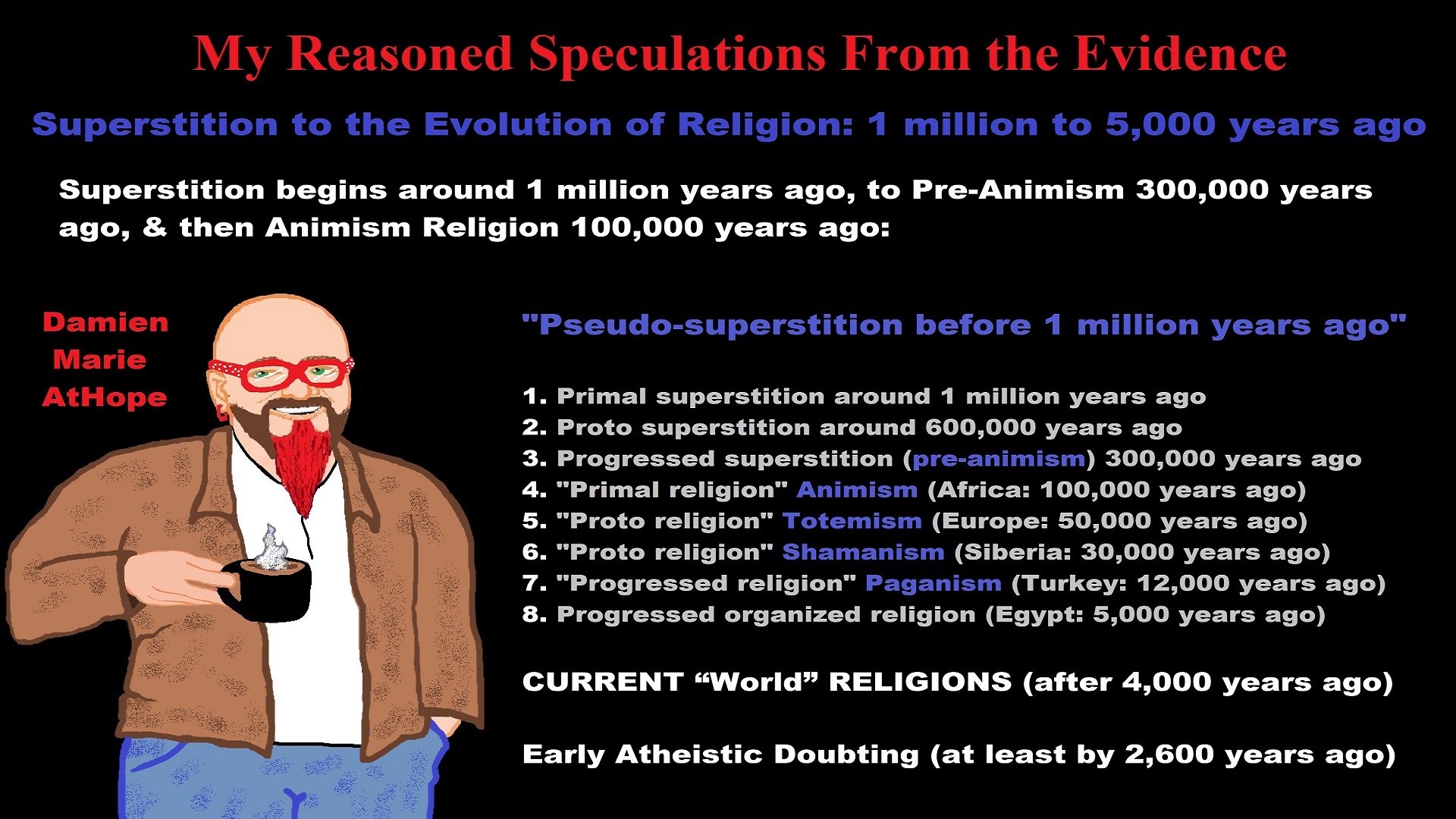
My thoughts on Religion Evolution with external links for more info:
- (Pre-Animism Africa mainly, but also Europe, and Asia at least 300,000 years ago), (Pre-Animism – Oxford Dictionaries)
- (Animism Africa around 100,000 years ago), (Animism – Britannica.com)
- (Totemism Europe around 50,000 years ago), (Totemism – Anthropology)
- (Shamanism Siberia around 30,000 years ago), (Shamanism – Britannica.com)
- (Paganism Turkey around 12,000 years ago), (Paganism – BBC Religion)
- (Progressed Organized Religion “Institutional Religion” Egypt around 5,000 years ago), (Ancient Egyptian Religion – Britannica.com)
- (CURRENT “World” RELIGIONS after 4,000 years ago) (Origin of Major Religions – Sacred Texts)
- (Early Atheistic Doubting at least by 2,600 years ago) (History of Atheism – Wikipedia)
“Religion is an Evolved Product” and Yes, Religion is Like Fear Given Wings…
Atheists talk about gods and religions for the same reason doctors talk about cancer, they are looking for a cure, or a firefighter talks about fires because they burn people and they care to stop them. We atheists too often feel a need to help the victims of mental slavery, held in the bondage that is the false beliefs of gods and the conspiracy theories of reality found in religions.
Understanding Religion Evolution:
- Pre-Animism (at least 300,000 years ago)
- Animism (Africa: 100,000 years ago)
- Totemism (Europe: 50,000 years ago)
- Shamanism (Siberia: 30,000 years ago)
- Paganism (Turkey: 12,000 years ago)
- Progressed organized religion (Egypt: 5,000 years ago), (Egypt, the First Dynasty 5,150 years ago)
- CURRENT “World” RELIGIONS (after 4,000 years ago)
- Early Atheistic Doubting (at least by 2,600 years ago)
“An Archaeological/Anthropological Understanding of Religion Evolution”
It seems ancient peoples had to survived amazing threats in a “dangerous universe (by superstition perceived as good and evil),” and human “immorality or imperfection of the soul” which was thought to affect the still living, leading to ancestor worship. This ancestor worship presumably led to the belief in supernatural beings, and then some of these were turned into the belief in gods. This feeble myth called gods were just a human conceived “made from nothing into something over and over, changing, again and again, taking on more as they evolve, all the while they are thought to be special,” but it is just supernatural animistic spirit-belief perceived as sacred.
Quick Evolution of Religion?
Pre-Animism (at least 300,000 years ago) pre-religion is a beginning that evolves into later Animism. So, Religion as we think of it, to me, all starts in a general way with Animism (Africa: 100,000 years ago) (theoretical belief in supernatural powers/spirits), then this is physically expressed in or with Totemism (Europe: 50,000 years ago) (theoretical belief in mythical relationship with powers/spirits through a totem item), which then enlists a full-time specific person to do this worship and believed interacting Shamanism (Siberia/Russia: 30,000 years ago) (theoretical belief in access and influence with spirits through ritual), and then there is the further employment of myths and gods added to all the above giving you Paganism (Turkey: 12,000 years ago) (often a lot more nature-based than most current top world religions, thus hinting to their close link to more ancient religious thinking it stems from). My hypothesis is expressed with an explanation of the building of a theatrical house (modern religions development). Progressed organized religion (Egypt: 5,000 years ago) with CURRENT “World” RELIGIONS (after 4,000 years ago).
Historically, in large city-state societies (such as Egypt or Iraq) starting around 5,000 years ago culminated to make religion something kind of new, a sociocultural-governmental-religious monarchy, where all or at least many of the people of such large city-state societies seem familiar with and committed to the existence of “religion” as the integrated life identity package of control dynamics with a fixed closed magical doctrine, but this juggernaut integrated religion identity package of Dogmatic-Propaganda certainly did not exist or if developed to an extent it was highly limited in most smaller prehistoric societies as they seem to lack most of the strong control dynamics with a fixed closed magical doctrine (magical beliefs could be at times be added or removed). Many people just want to see developed religious dynamics everywhere even if it is not. Instead, all that is found is largely fragments until the domestication of religion.
Religions, as we think of them today, are a new fad, even if they go back to around 6,000 years in the timeline of human existence, this amounts to almost nothing when seen in the long slow evolution of religion at least around 70,000 years ago with one of the oldest ritual worship. Stone Snake of South Africa: “first human worship” 70,000 years ago. This message of how religion and gods among them are clearly a man-made thing that was developed slowly as it was invented and then implemented peace by peace discrediting them all. Which seems to be a simple point some are just not grasping how devastating to any claims of truth when we can see the lie clearly in the archeological sites.
I wish people fought as hard for the actual values as they fight for the group/clan names political or otherwise they think support values. Every amount spent on war is theft to children in need of food or the homeless kept from shelter.
Here are several of my blog posts on history:
- To Find Truth You Must First Look
- (Magdalenian/Iberomaurusian) Connections to the First Paganists of the early Neolithic Near East Dating from around 17,000 to 12,000 Years Ago
- Natufians: an Ancient People at the Origins of Agriculture and Sedentary Life
- Possible Clan Leader/Special “MALE” Ancestor Totem Poles At Least 13,500 years ago?
- Jewish People with DNA at least 13,200 years old, Judaism, and the Origins of Some of its Ideas
- Baltic Reindeer Hunters: Swiderian, Lyngby, Ahrensburgian, and Krasnosillya cultures 12,020 to 11,020 years ago are evidence of powerful migratory waves during the last 13,000 years and a genetic link to Saami and the Finno-Ugric peoples.
- The Rise of Inequality: patriarchy and state hierarchy inequality
- Fertile Crescent 12,500 – 9,500 Years Ago: fertility and death cult belief system?
- 12,400 – 11,700 Years Ago – Kortik Tepe (Turkey) Pre/early-Agriculture Cultic Ritualism
- Ritualistic Bird Symbolism at Gobekli Tepe and its “Ancestor Cult”
- Male-Homosexual (female-like) / Trans-woman (female) Seated Figurine from Gobekli Tepe
- Could a 12,000-year-old Bull Geoglyph at Göbekli Tepe relate to older Bull and Female Art 25,000 years ago and Later Goddess and the Bull cults like Catal Huyuk?
- Sedentism and the Creation of goddesses around 12,000 years ago as well as male gods after 7,000 years ago.
- Alcohol, where Agriculture and Religion Become one? Such as Gobekli Tepe’s Ritualistic use of Grain as Food and Ritual Drink
- Neolithic Ritual Sites with T-Pillars and other Cultic Pillars
- Paganism: Goddesses around 12,000 years ago then Male Gods after 7,000 years ago
- First Patriarchy: Split of Women’s Status around 12,000 years ago & First Hierarchy: fall of Women’s Status around 5,000 years ago.
- Natufians: an Ancient People at the Origins of Agriculture and Sedentary Life
- J DNA and the Spread of Agricultural Religion (paganism)
- Paganism: an approximately 12,000-year-old belief system
- Paganism 12,000 years old: related to “Anarchism and Socialism” (Pre-Capitalism)
- Shaman burial in Israel 12,000 years ago and the Shamanism Phenomena
- Need to Mythicized: gods and goddesses
- 12,000 – 7,000 Years Ago – Paleo-Indian Culture (The Americas)
- 12,000 – 2,000 Years Ago – Indigenous-Scandinavians (Nordic)
- Norse did not wear helmets with horns?
- Pre-Pottery Neolithic Skull Cult around 11,500 to 8,400 Years Ago?
- 10,400 – 10,100 Years Ago, in Turkey the Nevail Cori Religious Settlement
- 9,000-6,500 Years Old Submerged Pre-Pottery/Pottery Neolithic Ritual Settlements off Israel’s Coast
- Catal Huyuk “first religious designed city” around 9,500 to 7,700 years ago (Turkey)
- Cultic Hunting at Catal Huyuk “first religious designed city”
- Special Items and Art as well as Special Elite Burials at Catal Huyuk
- New Rituals and Violence with the appearance of Pottery and People?
- Haplogroup N and its related Uralic Languages and Cultures
- Ainu people, Sámi people, Native Americans, the Ancient North Eurasians, and Paganistic-Shamanism with Totemism
- Ideas, Technology and People from Turkey, Europe, to China and Back again 9,000 to 5,000 years ago?
- First Pottery of Europe and the Related Cultures
- 9,000 years old Neolithic Artifacts Judean Desert and Hills Israel
- 9,000-7,000 years-old Sex and Death Rituals: Cult Sites in Israel, Jordan, and the Sinai
- 9,000-8500 year old Horned Female shaman Bad Dürrenberg Germany
- Neolithic Jewelry and the Spread of Farming in Europe Emerging out of West Turkey
- 8,600-year-old Tortoise Shells in Neolithic graves in central China have Early Writing and Shamanism
- Swing of the Mace: the rise of Elite, Forced Authority, and Inequality begin to Emerge 8,500 years ago?
- Migrations and Changing Europeans Beginning around 8,000 Years Ago
- My “Steppe-Anatolian-Kurgan hypothesis” 8,000/7,000 years ago
- Around 8,000-year-old Shared Idea of the Mistress of Animals, “Ritual” Motif
- Pre-Columbian Red-Paint (red ochre) Maritime Archaic Culture 8,000-3,000 years ago
- 7,522-6,522 years ago Linear Pottery culture which I think relates to Arcane Capitalism’s origins
- Arcane Capitalism: Primitive socialism, Primitive capital, Private ownership, Means of production, Market capitalism, Class discrimination, and Petite bourgeoisie (smaller capitalists)
- 7,500-4,750 years old Ritualistic Cucuteni-Trypillian culture of Moldova, Romania, and Ukraine
- Roots of a changing early society 7,200-6,700 years ago Jordan and Israel
- Agriculture religion (Paganism) with farming reached Britain between about 7,000 to 6,500 or so years ago and seemingly expressed in things like Western Europe’s Long Barrows
- My Thoughts on Possible Migrations of “R” DNA and Proto-Indo-European?
- “Millet” Spreading from China 7,022 years ago to Europe and related Language may have Spread with it leading to Proto-Indo-European
- Proto-Indo-European (PIE), ancestor of Indo-European languages: DNA, Society, Language, and Mythology
- The Dnieper–Donets culture and Asian varieties of Millet from China to the Black Sea region of Europe by 7,022 years ago
- Kurgan 6,000 years ago/dolmens 7,000 years ago: funeral, ritual, and other?
- 7,020 to 6,020-year-old Proto-Indo-European Homeland of Urheimat or proposed home of their Language and Religion
- Ancient Megaliths: Kurgan, Ziggurat, Pyramid, Menhir, Trilithon, Dolman, Kromlech, and Kromlech of Trilithons
- The Mytheme of Ancient North Eurasian Sacred-Dog belief and similar motifs are found in Indo-European, Native American, and Siberian comparative mythology
- Elite Power Accumulation: Ancient Trade, Tokens, Writing, Wealth, Merchants, and Priest-Kings
- Sacred Mounds, Mountains, Kurgans, and Pyramids may hold deep connections?
- Between 7,000-5,000 Years ago, rise of unequal hierarchy elite, leading to a “birth of the State” or worship of power, strong new sexism, oppression of non-elites, and the fall of Women’s equal status
- Paganism 7,000-5,000 years old: related to “Anarchism and Socialism” (Capitalism) (World War 0) Elite & their slaves
- Hell and Underworld mythologies starting maybe as far back as 7,000 to 5,000 years ago with the Proto-Indo-Europeans?
- The First Expression of the Male God around 7,000 years ago?
- White (light complexion skin) Bigotry and Sexism started 7,000 years ago?
- Around 7,000-year-old Shared Idea of the Divine Bird (Tutelary and/or Trickster spirit/deity), “Ritual” Motif
- Nekhbet an Ancient Egyptian Vulture Goddess and Tutelary Deity
- 6,720 to 4,920 years old Ritualistic Hongshan Culture of Inner Mongolia with 5,000-year-old Pyramid Mounds and Temples
- First proto-king in the Balkans, Varna culture around 6,500 years ago?
- 6,500–5,800 years ago in Israel Late Chalcolithic (Copper Age) Period in the Southern Levant Seems to Express Northern Levant Migrations, Cultural and Religious Transfer
- KING OF BEASTS: Master of Animals “Ritual” Motif, around 6,000 years old or older…
- Around 6000-year-old Shared Idea of the Solid Wheel & the Spoked Wheel-Shaped Ritual Motif
- “The Ghassulian Star,” a mysterious 6,000-year-old mural from Jordan; a Proto-Star of Ishtar, Star of Inanna or Star of Venus?
- Religious/Ritual Ideas, including goddesses and gods as well as ritual mounds or pyramids from Northeastern Asia at least 6,000 years old, seemingly filtering to Iran, Iraq, the Mediterranean, Europe, Egypt, and the Americas?
- Maykop (5,720–5,020 years ago) Caucasus region Bronze Age culture-related to Copper Age farmers from the south, influenced by the Ubaid period and Leyla-Tepe culture, as well as influencing the Kura-Araxes culture
- 5-600-year-old Tomb, Mummy, and First Bearded Male Figurine in a Grave
- Kura-Araxes Cultural 5,520 to 4,470 years old DNA traces to the Canaanites, Arabs, and Jews
- Minoan/Cretan (Keftiu) Civilization and Religion around 5,520 to 3,120 years ago
- Evolution Of Science at least by 5,500 years ago
- 5,500 Years old birth of the State, the rise of Hierarchy, and the fall of Women’s status
- “Jiroft culture” 5,100 – 4,200 years ago and the History of Iran
- Stonehenge: Paganistic Burial and Astrological Ritual Complex, England (5,100-3,600 years ago)
- Around 5,000-year-old Shared Idea of the “Tree of Life” Ritual Motif
- Complex rituals for elite, seen from China to Egypt, at least by 5,000 years ago
- Around 5,000 years ago: “Birth of the State” where Religion gets Military Power and Influence
- The Center of the World “Axis Mundi” and/or “Sacred Mountains” Mythology Could Relate to the Altai Mountains, Heart of the Steppe
- Progressed organized religion starts, an approximately 5,000-year-old belief system
- China’s Civilization between 5,000-3,000 years ago, was a time of war and class struggle, violent transition from free clans to a Slave or Elite society
- Origin of Logics is Naturalistic Observation at least by around 5,000 years ago.
- Paganism 5,000 years old: progressed organized religion and the state: related to “Anarchism and Socialism” (Kings and the Rise of the State)
- Ziggurats (multi-platform temples: 4,900 years old) to Pyramids (multi-platform tombs: 4,700 years old)
- Did a 4,520–4,420-year-old Volcano In Turkey Inspire the Bible God?
- Finland’s Horned Shaman and Pre-Horned-God at least 4,500 years ago?
- 4,000-year-Old Dolmens in Israel: A Connected Dolmen Religious Phenomenon?
- Creation myths: From chaos, Ex nihilo, Earth-diver, Emergence, World egg, and World parent
- Bronze Age “Ritual” connections of the Bell Beaker culture with the Corded Ware/Single Grave culture, which were related to the Yamnaya culture and Proto-Indo-European Languages/Religions
- Low Gods (Earth/ Tutelary deity), High Gods (Sky/Supreme deity), and Moralistic Gods (Deity enforcement/divine order)
- The exchange of people, ideas, and material-culture including, to me, the new god (Sky Father) and goddess (Earth Mother) religion between the Cucuteni-Trypillians and others which is then spread far and wide
- Koryaks: Indigenous People of the Russian Far East and Big Raven myths also found in Tlingit, Haida, Tsimshian, and other Indigenous People of North America
- 42 Principles Of Maat (Egyptian Goddess of the justice) around 4,400 years ago, 2000 Years Before Ten Commandments
- “Happy Easter” Well Happy Eostre/Ishter
- 4,320-3,820 years old “Shimao” (North China) site with Totemistic-Shamanistic Paganism and a Stepped Pyramid
- 4,250 to 3,400 Year old Stonehenge from Russia: Arkaim?
- 4,100-year-old beaker with medicinal & flowering plants in a grave of a woman in Scotland
- Early European Farmer ancestry, Kelif el Boroud people with the Cardial Ware culture, and the Bell Beaker culture Paganists too, spread into North Africa, then to the Canary Islands off West Africa
- Flood Accounts: Gilgamesh epic (4,100 years ago) Noah in Genesis (2,600 years ago)
- Paganism 4,000 years old: related to “Anarchism and Socialism” (First Moralistic gods, then the Origin time of Monotheism)
- When was the beginning: TIMELINE OF CURRENT RELIGIONS, which start around 4,000 years ago.
- Early Religions Thought to Express Proto-Monotheistic Systems around 4,000 years ago
- Kultepe? An archaeological site with a 4,000 years old women’s rights document.
- Single God Religions (Monotheism) = “Man-o-theism” started around 4,000 years ago with the Great Sky Spirit/God Tiān (天)?
- Confucianism’s Tiān (Shangdi god 4,000 years old): Supernaturalism, Pantheism or Theism?
- Yes, Your Male God is Ridiculous
- Mythology, a Lunar Deity is a Goddess or God of the Moon
- Sacred Land, Hills, and Mountains: Sami Mythology (Paganistic Shamanism)
- Horse Worship/Sacrifice: mythical union of Ruling Elite/Kingship and the Horse
- The Amorite/Amurru people’s God Amurru “Lord of the Steppe”, relates to the Origins of the Bible God?
- Bronze Age Exotic Trade Routes Spread Quite Far as well as Spread Religious Ideas with Them
- Sami and the Northern Indigenous Peoples Landscape, Language, and its Connection to Religion
- Prototype of Ancient Analemmatic Sundials around 3,900-3,150 years ago and a Possible Solar Connection to gods?
- Judaism is around 3,450 or 3,250 years old. (“Paleo-Hebrew” 3,000 years ago and Torah 2,500 years ago)
- The Weakening of Ancient Trade and the Strengthening of Religions around 3000 years ago?
- Are you aware that there are religions that worship women gods, explain now religion tears women down?
- Animistic, Totemistic, and Paganistic Superstition Origins of bible god and the bible’s Religion.
- Myths and Folklore: “Trickster gods and goddesses”
- Jews, Judaism, and the Origins of Some of its Ideas
- An Old Branch of Religion Still Giving Fruit: Sacred Trees
- Dating the BIBLE: naming names and telling times (written less than 3,000 years ago, provable to 2,200 years ago)
- Did a Volcano Inspire the bible god?
- Dené–Yeniseian language, Old Copper Complex, and Pre-Columbian Mound Builders?
- No “dinosaurs and humans didn’t exist together just because some think they are in the bible itself”
- Sacred Shit and Sacred Animals?
- Everyone Killed in the Bible Flood? “Nephilim” (giants)?
- Hey, Damien dude, I have a question for you regarding “the bible” Exodus.
- Archaeology Disproves the Bible
- Bible Battle, Just More, Bible Babble
- The Jericho Conquest lie?
- Canaanites and Israelites?
- Accurate Account on how did Christianity Began?
- Let’s talk about Christianity.
- So the 10 commandments isn’t anything to go by either right?
- Misinformed christian
- Debunking Jesus?
- Paulism vs Jesus
- Ok, you seem confused so let’s talk about Buddhism.
- Unacknowledged Buddhism: Gods, Savior, Demons, Rebirth, Heavens, Hells, and Terrorism
- His Foolishness The Dalai Lama
- Yin and Yang is sexist with an ORIGIN around 2,300 years ago?
- I Believe Archaeology, not Myths & Why Not, as the Religious Myths Already Violate Reason!
- Archaeological, Scientific, & Philosophic evidence shows the god myth is man-made nonsense.
- Aquatic Ape Theory/Hypothesis? As Always, Just Pseudoscience.
- Ancient Aliens Conspiracy Theorists are Pseudohistorians
- The Pseudohistoric and Pseudoscientific claims about “Bakoni Ruins” of South Africa
- Why do people think Religion is much more than supernaturalism and superstitionism?
- Religion is an Evolved Product
- Was the Value of Ancient Women Different?
- 1000 to 1100 CE, human sacrifice Cahokia Mounds a pre-Columbian Native American site
- Feminist atheists as far back as the 1800s?
- Promoting Religion as Real is Mentally Harmful to a Flourishing Humanity
- Screw All Religions and Their Toxic lies, they are all fraud
- Forget Religions’ Unfounded Myths, I Have Substantiated “Archaeology Facts.”
- Religion Dispersal throughout the World
- I Hate Religion Just as I Hate all Pseudoscience
- Exposing Scientology, Eckankar, Wicca and Other Nonsense?
- Main deity or religious belief systems
- Quit Trying to Invent Your God From the Scraps of Science.
- Archaeological, Scientific, & Philosophic evidence shows the god myth is man-made nonsense.
- Ancient Alien Conspiracy Theorists: Misunderstanding, Rhetoric, Misinformation, Fabrications, and Lies
- Misinformation, Distortion, and Pseudoscience in Talking with a Christian Creationist
- Judging the Lack of Goodness in Gods, Even the Norse God Odin
- Challenging the Belief in God-like Aliens and Gods in General
- A Challenge to Christian use of Torture Devices?
- Yes, Hinduism is a Religion
- Trump is One of the Most Reactionary Forces of Far-right Christian Extremism
- Was the Bull Head a Symbol of God? Yes!
- Primate Death Rituals
- Christian – “God and Christianity are objectively true”
- Australopithecus afarensis Death Ritual?
- You Claim Global Warming is a Hoax?
- Doubter of Science and Defamer of Atheists?
- I think that sounds like the Bible?
- History of the Antifa (“anti-fascist”) Movements
- Indianapolis Anti-Blasphemy Laws #Free Soheil Rally
- Damien, you repeat the golden rule in so many forms then you say religion is dogmatic?
- Science is a Trustable Methodology whereas Faith is not Trustable at all!
- Was I ever a believer, before I was an atheist?
- Atheists rise in reason
- Mistrust of science?
- Open to Talking About the Definition of ‘God’? But first, we address Faith.
- ‘United Monarchy’ full of splendor and power – Saul, David, and Solomon? Most likely not.
- Is there EXODUS ARCHAEOLOGY? The short answer is “no.”
- Lacking Proof of Bigfoots, Unicorns, and Gods is Just a Lack of Research?
- Religion and Politics: Faith Beliefs vs. Rational Thinking
- Hammer of Truth that lying pig RELIGION: challenged by an archaeologist
- “The Hammer of Truth” -ontology question- What do You Mean by That?
- Navigation of a bad argument: Ad Hominem vs. Attack
- Why is it Often Claimed that Gods have a Gender?
- Why are basically all monotheistic religions ones that have a male god?
- Shifting through the Claims in support of Faith
- Dear Mr. AtHope, The 20th Century is an Indictment of Secularism and a Failed Atheist Century
- An Understanding of the Worldwide Statistics and Dynamics of Terrorist Incidents and Suicide Attacks
- Intoxication and Evolution? Addressing and Assessing the “Stoned Ape” or “Drunken Monkey” Theories as Catalysts in Human Evolution
- Sacred Menstrual cloth? Inanna’s knot, Isis knot, and maybe Ma’at’s feather?
- Damien, why don’t the Hebrews accept the bible stories?
- Dealing with a Troll and Arguing Over Word Meaning
- Knowledge without Belief? Justified beliefs or disbeliefs worthy of Knowledge?
- Afrocentrism and African Religions
- Crecganford @crecganford offers history & stories of the people, places, gods, & culture
- Empiricism-Denier?
I am not an academic. I am a revolutionary that teaches in public, in places like social media, and in the streets. I am not a leader by some title given but from my commanding leadership style of simply to start teaching everywhere to everyone, all manner of positive education.
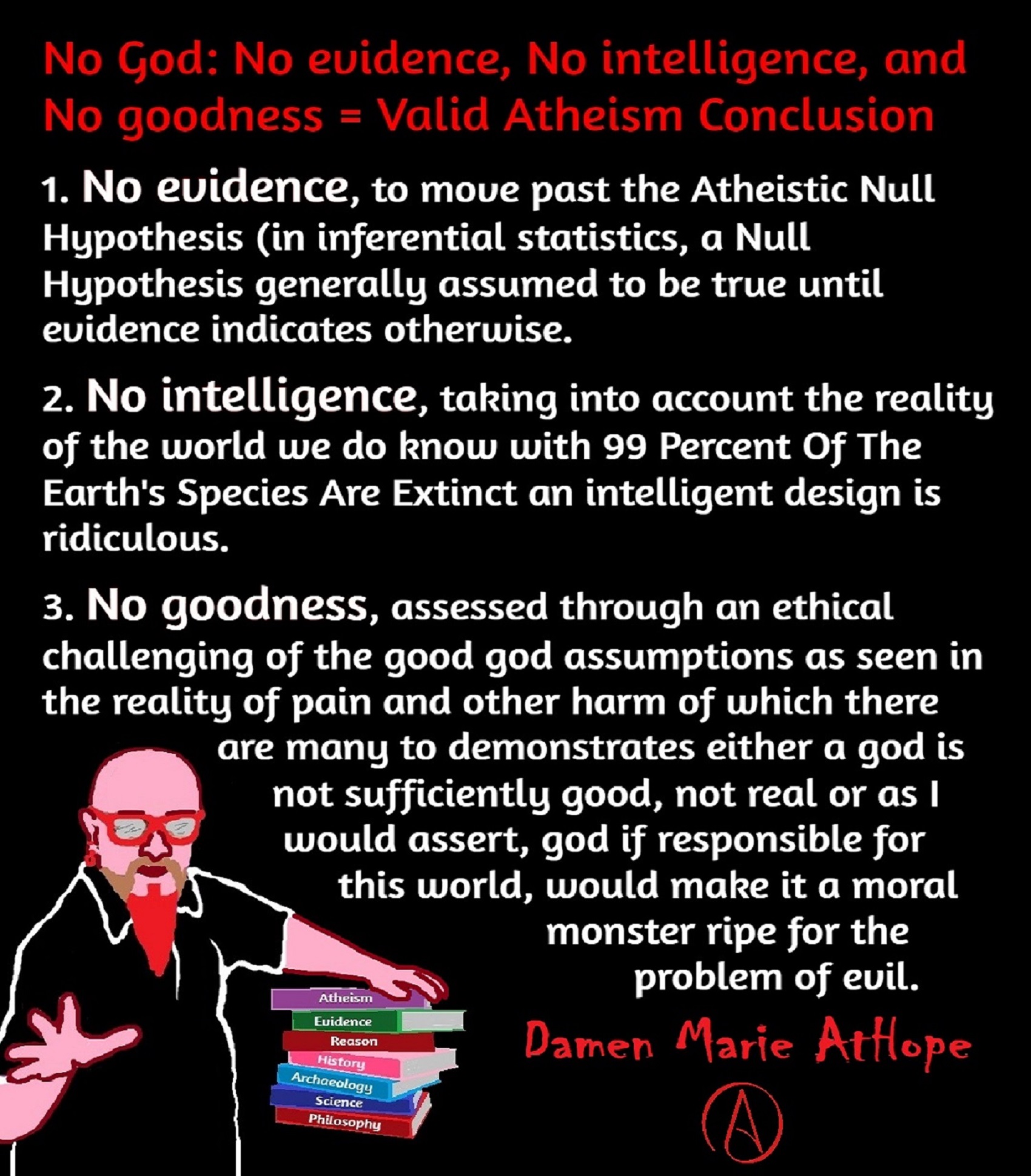
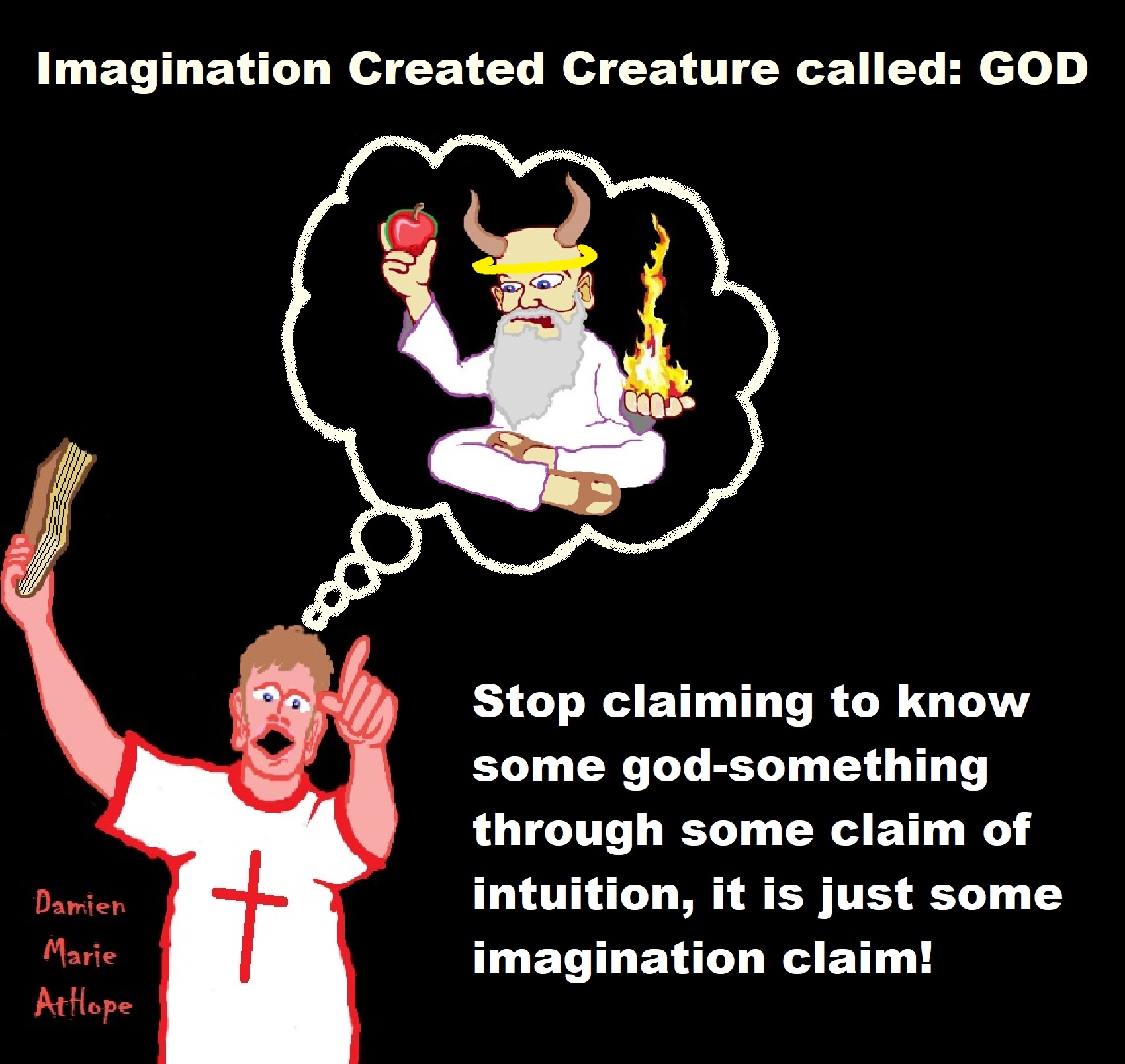
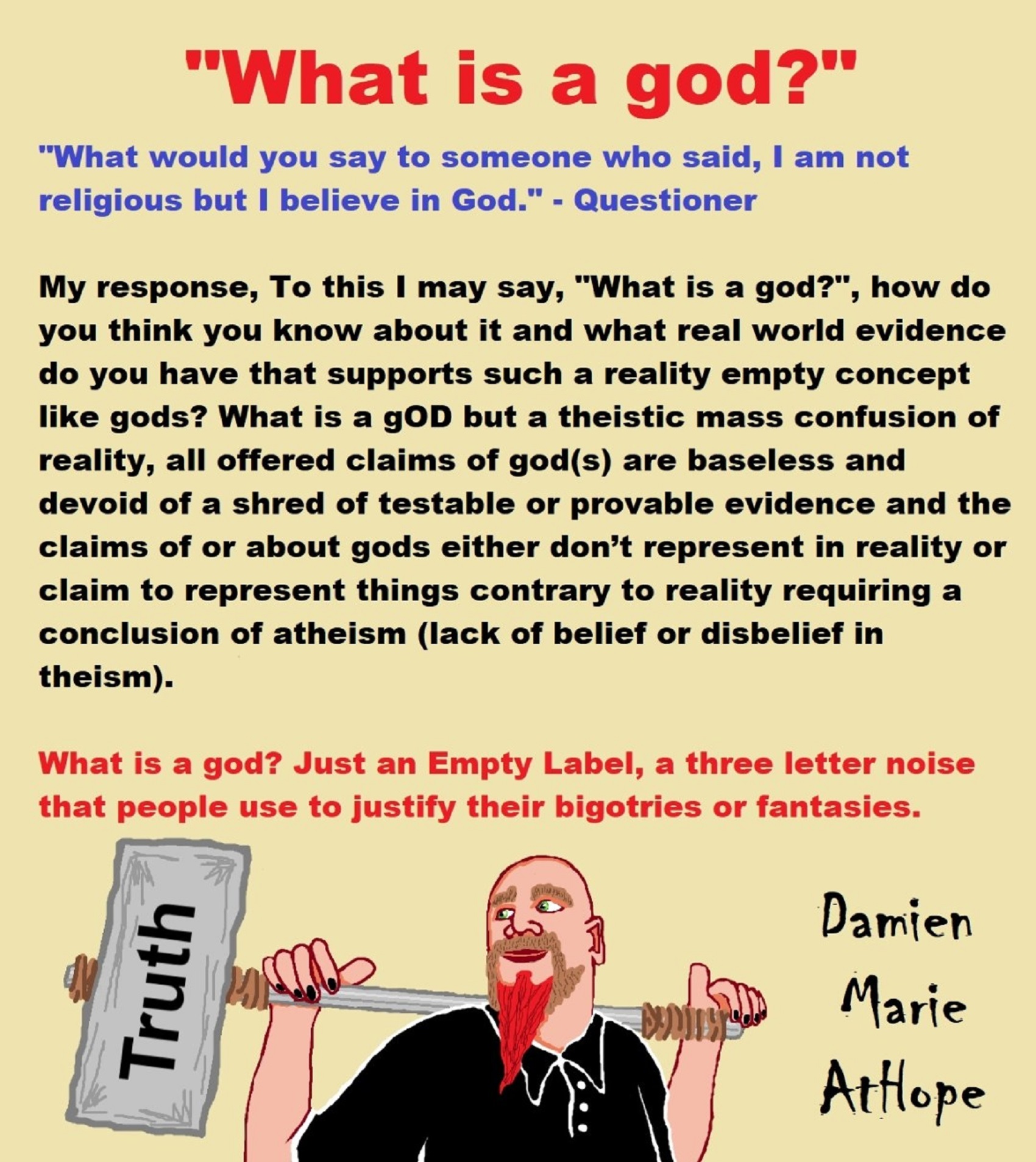
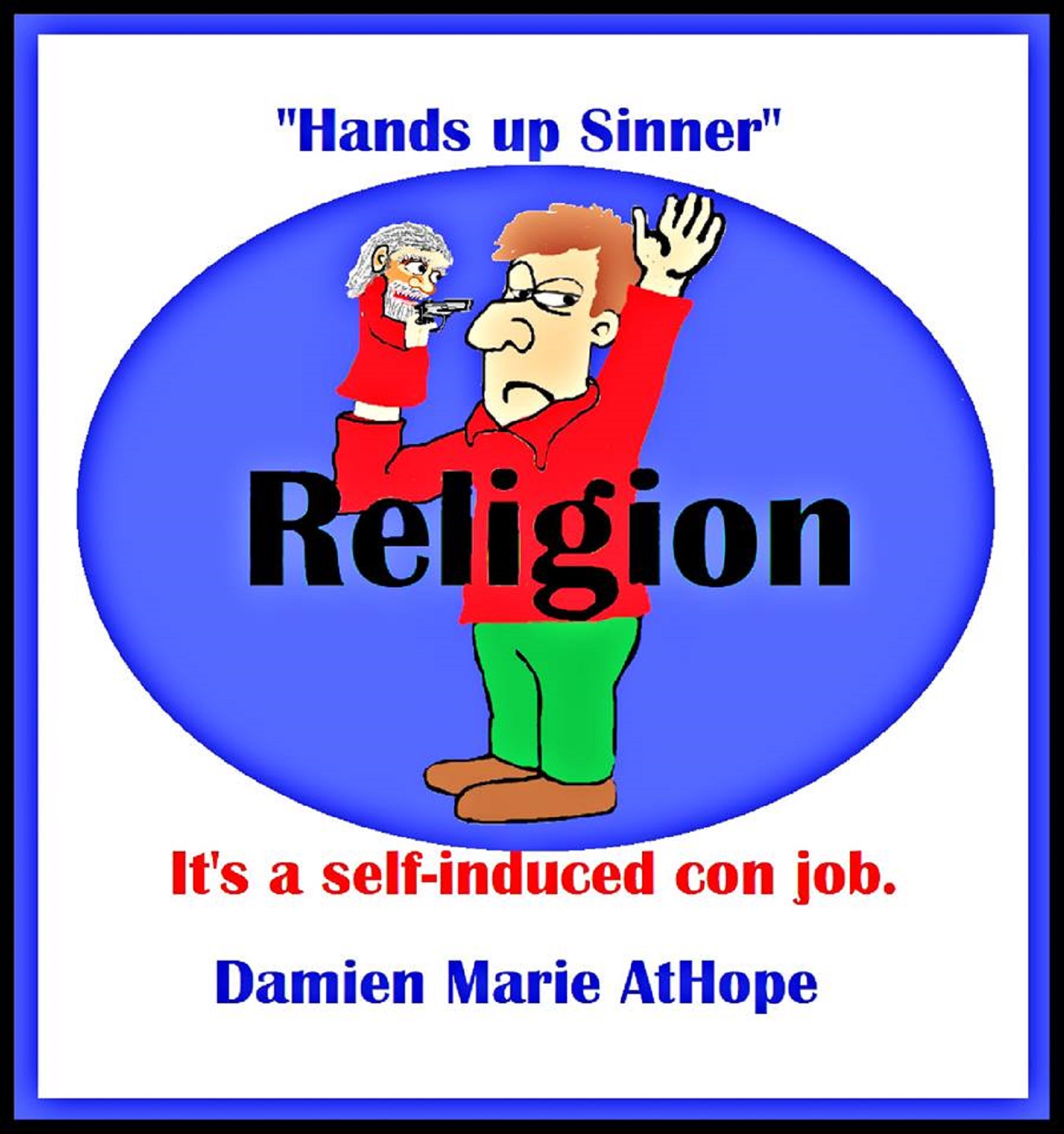
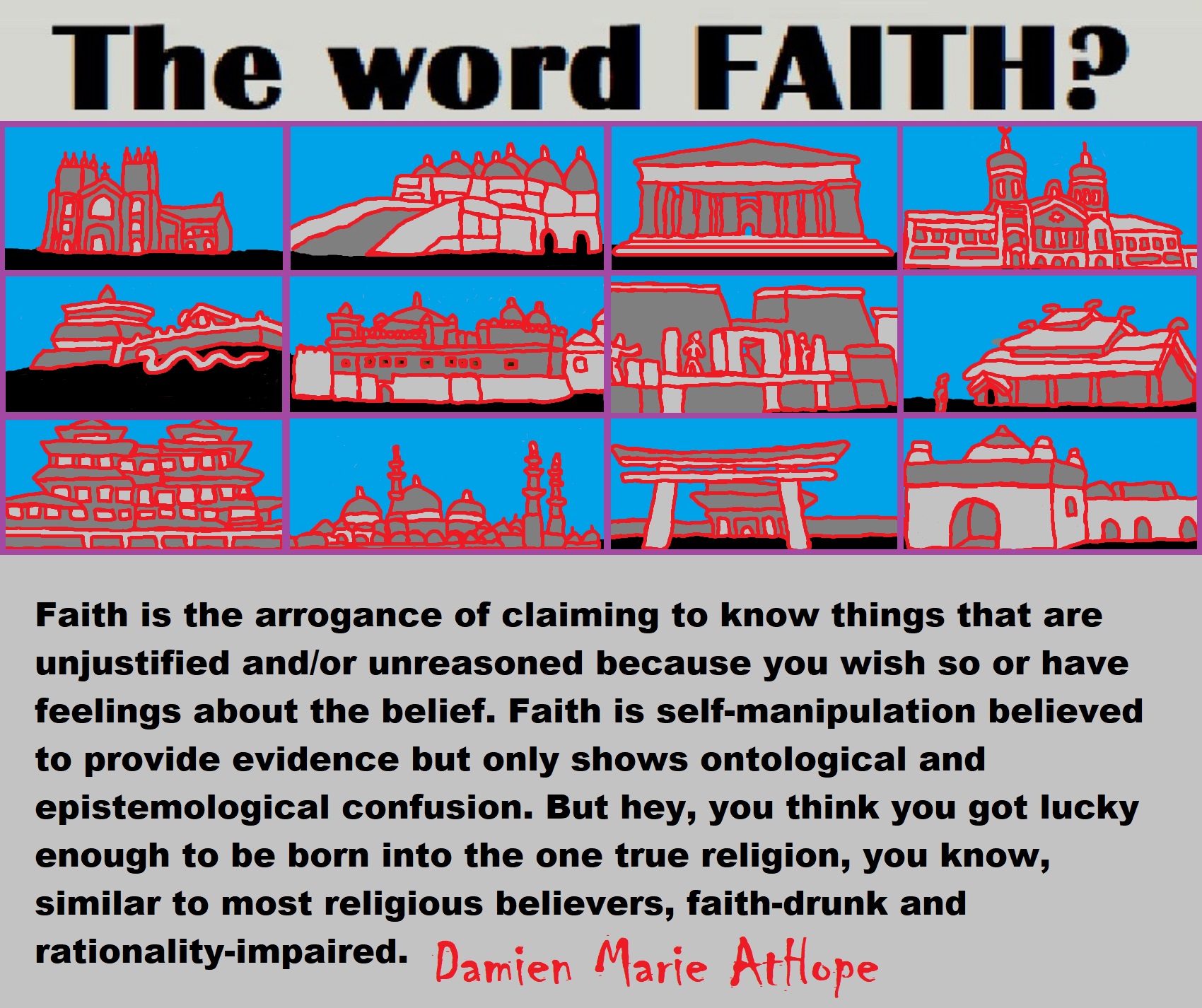
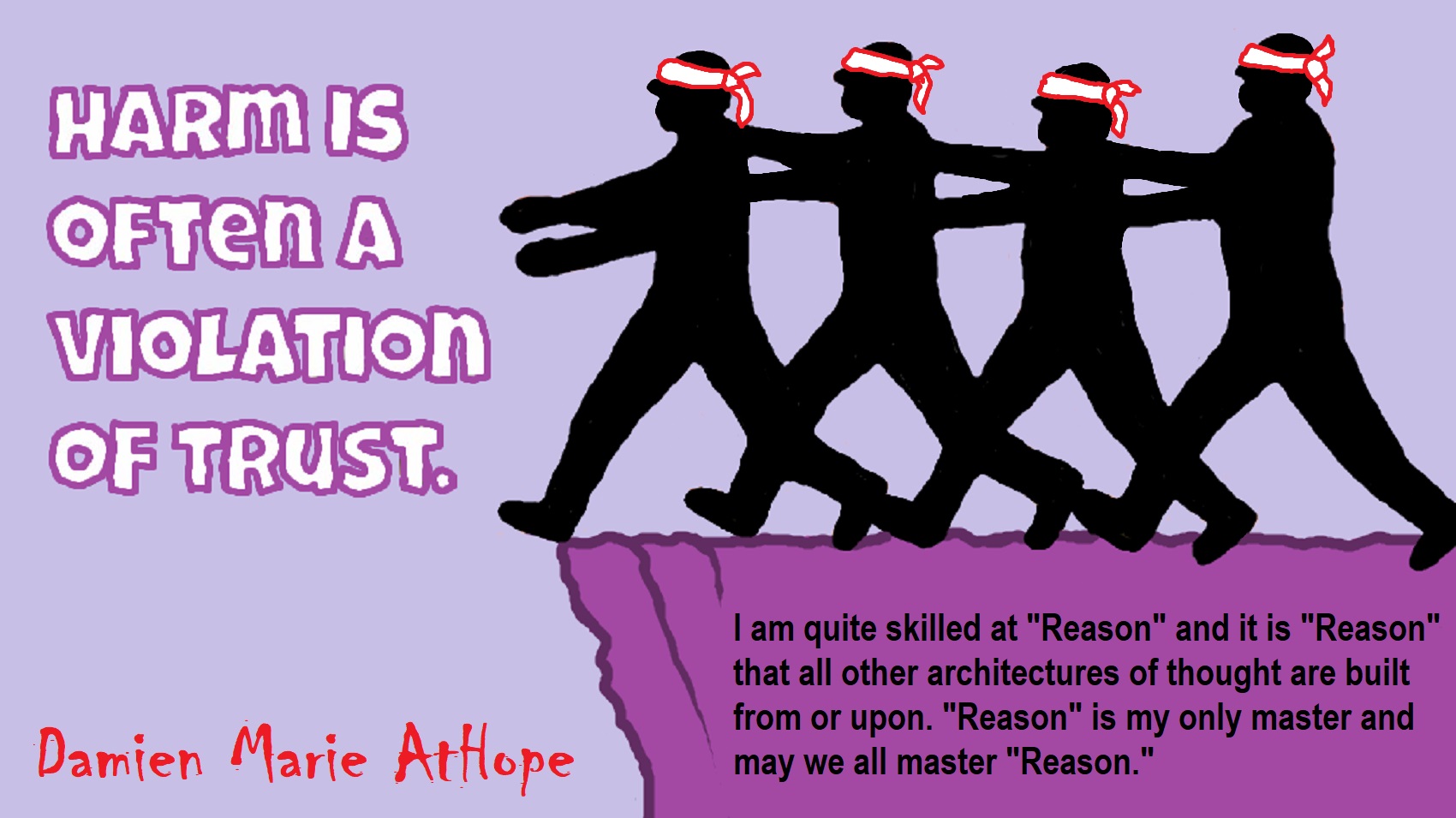
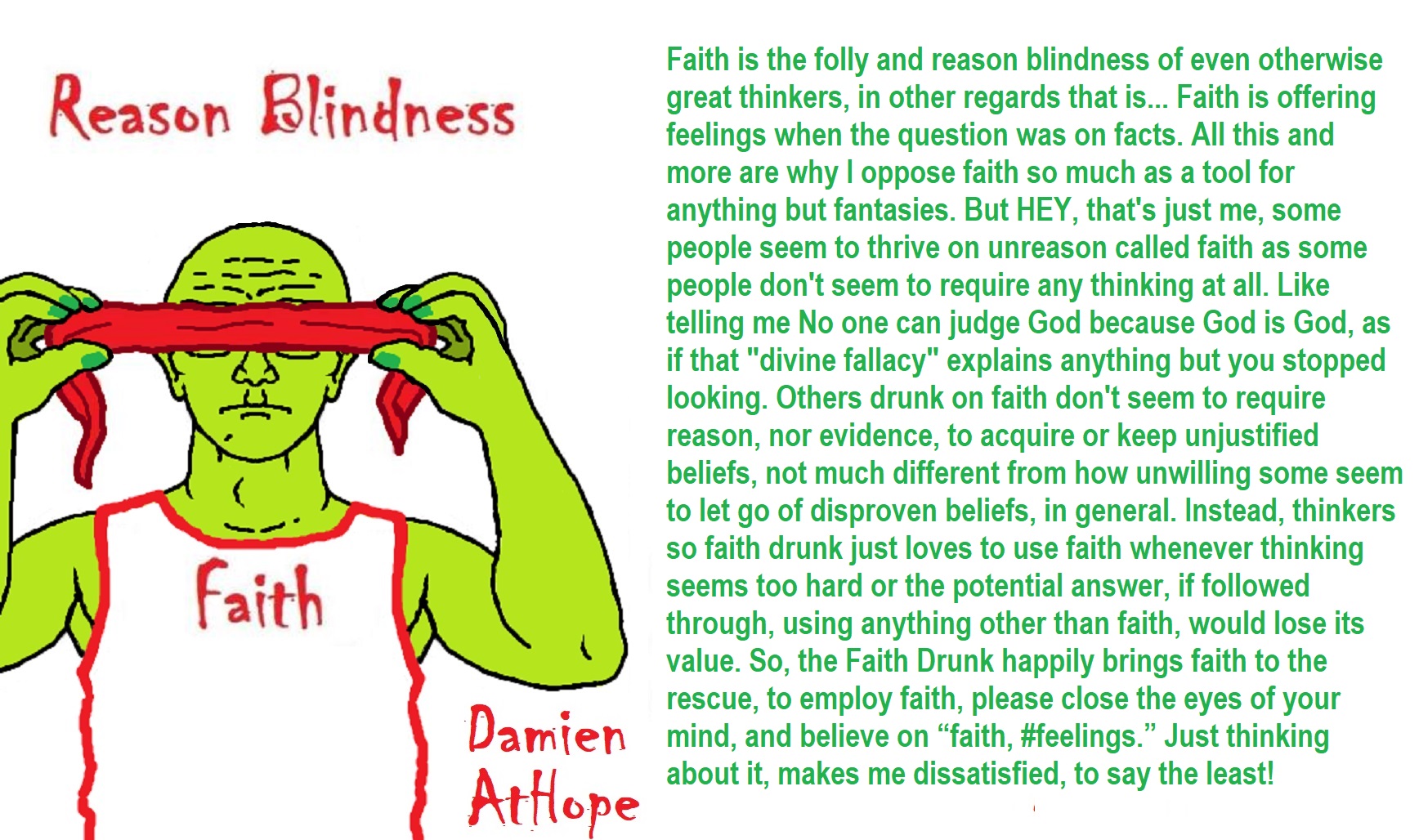
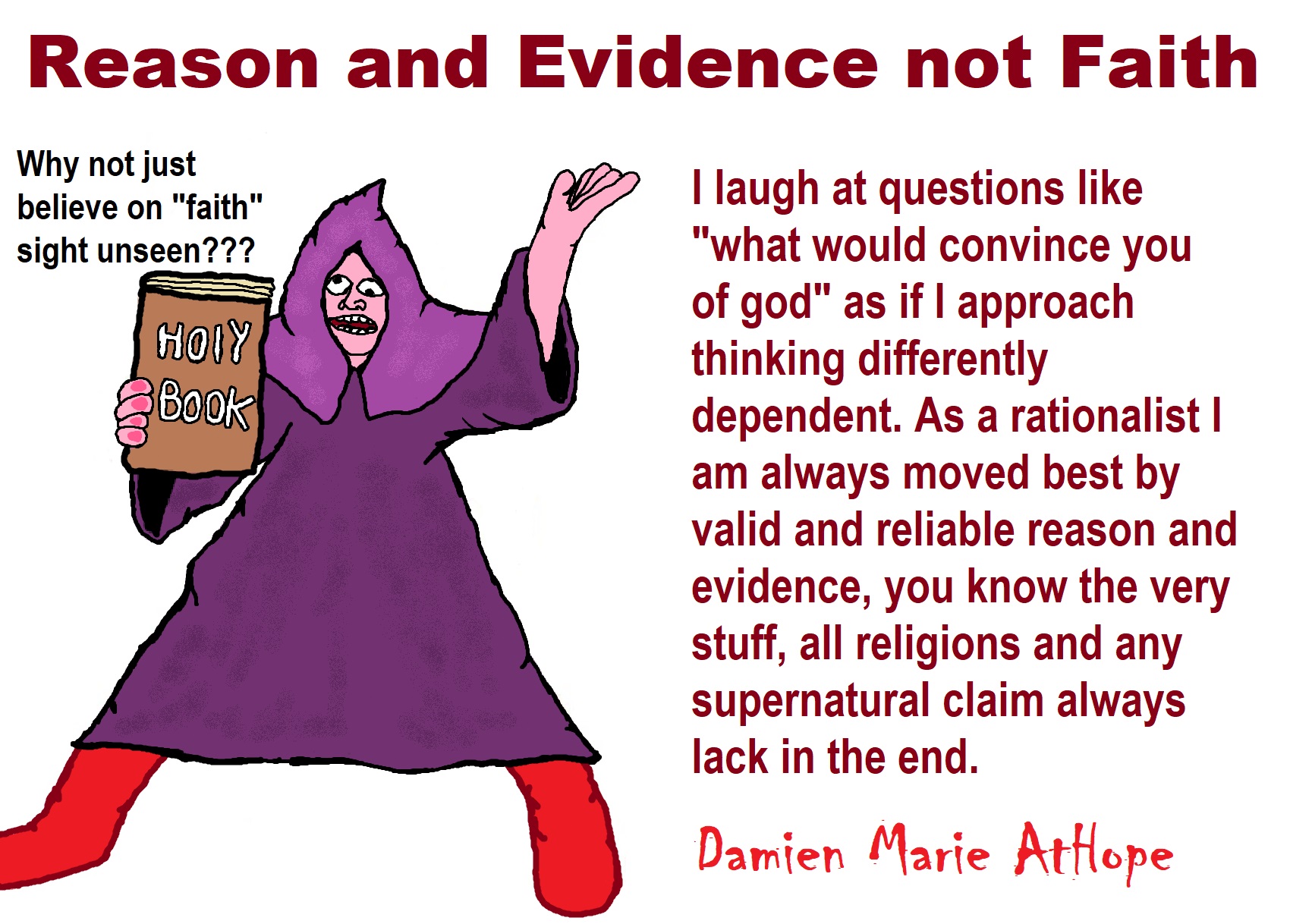
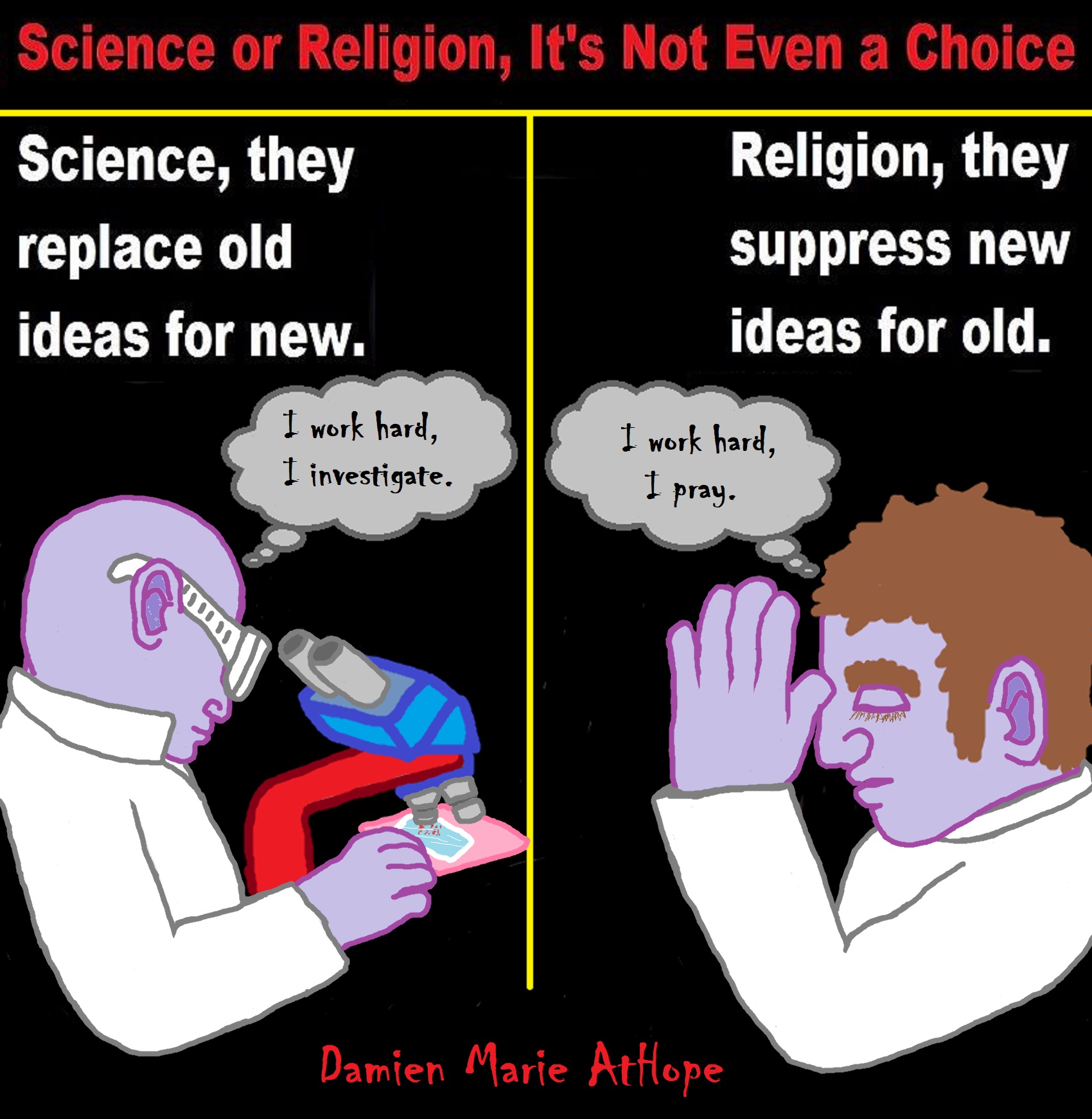
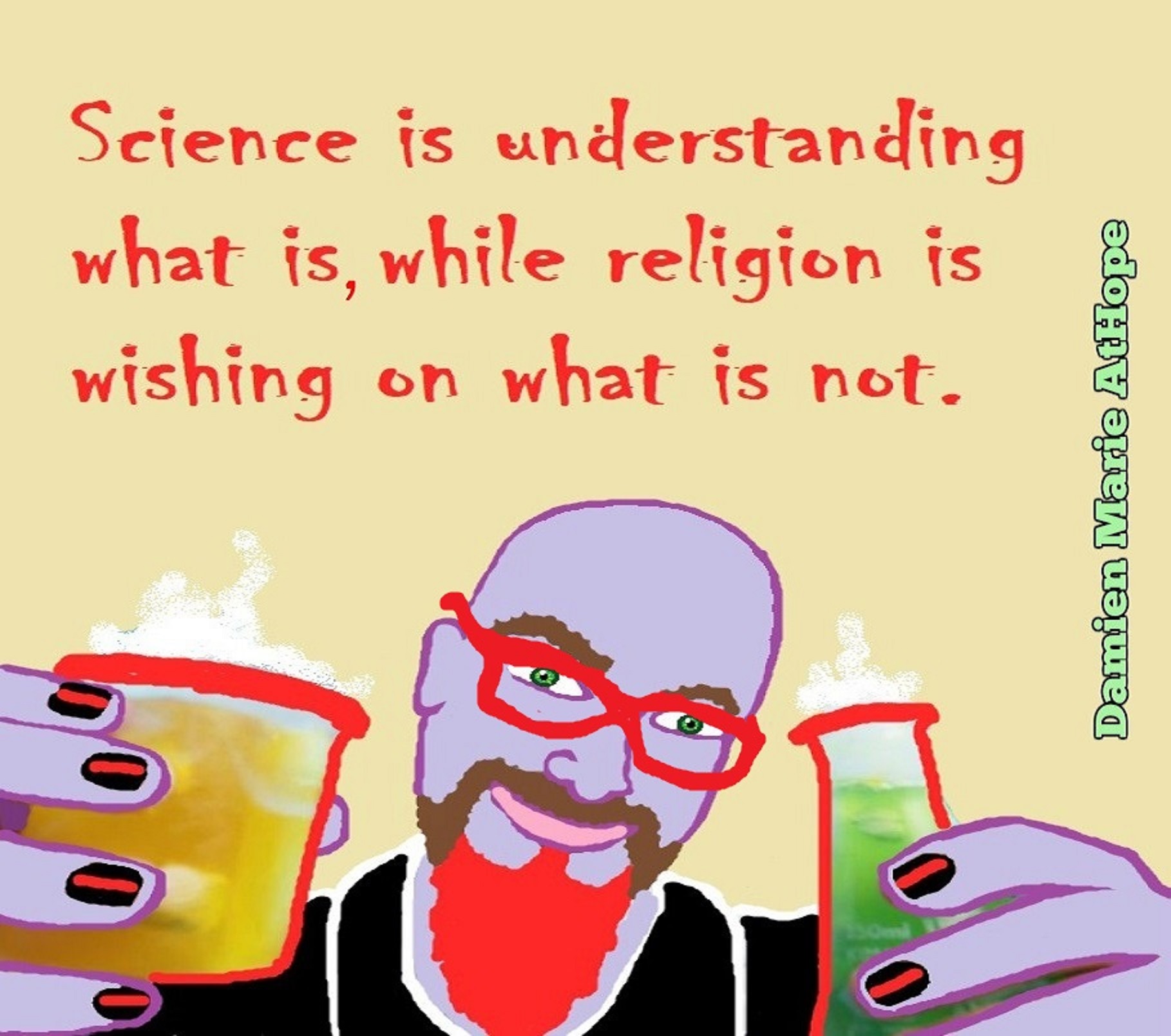
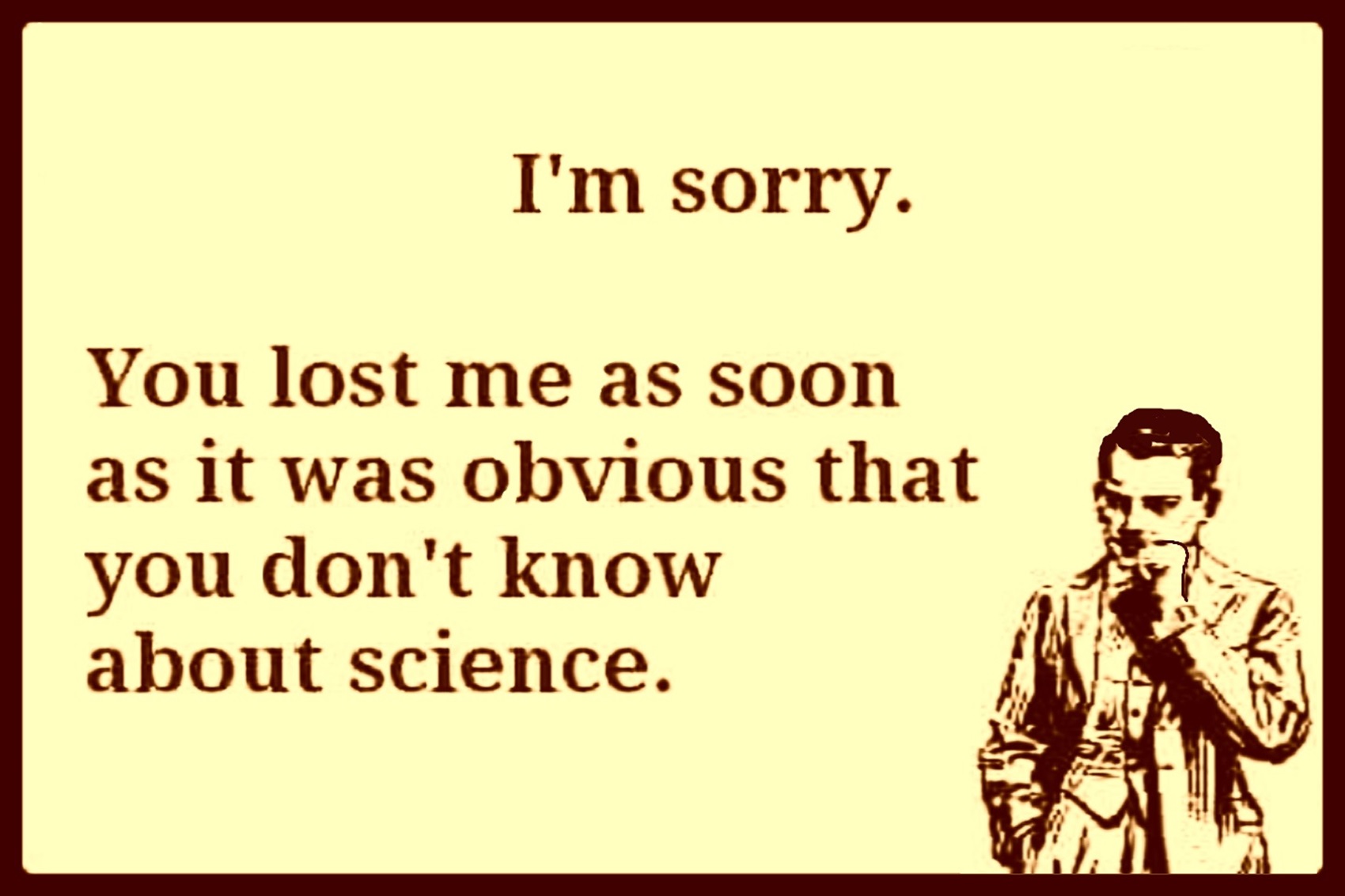

“Theists, there has to be a god, as something can not come from nothing.”
Well, thus something (unknown) happened and then there was something. This does not tell us what the something that may have been involved with something coming from nothing. A supposed first cause, thus something (unknown) happened and then there was something is not an open invitation to claim it as known, neither is it justified to call or label such an unknown as anything, especially an unsubstantiated magical thinking belief born of mythology and religious storytelling.


While hallucinogens are associated with shamanism, it is alcohol that is associated with paganism.
The Atheist-Humanist-Leftist Revolutionaries Shows in the prehistory series:
Show two: Pre-animism 300,000 years old and animism 100,000 years old: related to “Anarchism and Socialism”
Show tree: Totemism 50,000 years old: related to “Anarchism and Socialism”
Show four: Shamanism 30,000 years old: related to “Anarchism and Socialism”
Show five: Paganism 12,000 years old: related to “Anarchism and Socialism”
Show six: Emergence of hierarchy, sexism, slavery, and the new male god dominance: Paganism 7,000-5,000 years old: related to “Anarchism and Socialism” (Capitalism) (World War 0) Elite and their slaves!
Prehistory: related to “Anarchism and Socialism” the division of labor, power, rights, and recourses: VIDEO
Pre-animism 300,000 years old and animism 100,000 years old: related to “Anarchism and Socialism”: VIDEO
Totemism 50,000 years old: related to “Anarchism and Socialism”: VIDEO
Shamanism 30,000 years old: related to “Anarchism and Socialism”: VIDEO
Paganism 12,000 years old: related to “Anarchism and Socialism” (Pre-Capitalism): VIDEO
Paganism 7,000-5,000 years old: related to “Anarchism and Socialism” (Capitalism) (World War 0) Elite and their slaves: VIEDO
Paganism 5,000 years old: progressed organized religion and the state: related to “Anarchism and Socialism” (Kings and the Rise of the State): VIEDO
Paganism 4,000 years old: related to “Anarchism and Socialism” (First Moralistic gods, then the Origin time of Monotheism): VIEDO
I do not hate simply because I challenge and expose myths or lies any more than others being thought of as loving simply because of the protection and hiding from challenge their favored myths or lies.
The truth is best championed in the sunlight of challenge.
An archaeologist once said to me “Damien religion and culture are very different”
My response, So are you saying that was always that way, such as would you say Native Americans’ cultures are separate from their religions? And do you think it always was the way you believe?
I had said that religion was a cultural product. That is still how I see it and there are other archaeologists that think close to me as well. Gods too are the myths of cultures that did not understand science or the world around them, seeing magic/supernatural everywhere.
I personally think there is a goddess and not enough evidence to support a male god at Çatalhöyük but if there was both a male and female god and goddess then I know the kind of gods they were like Proto-Indo-European mythology.
This series idea was addressed in, Anarchist Teaching as Free Public Education or Free Education in the Public: VIDEO
Our 12 video series: Organized Oppression: Mesopotamian State Force and the Politics of power (9,000-4,000 years ago), is adapted from: The Complete and Concise History of the Sumerians and Early Bronze Age Mesopotamia (7000-2000 BC): https://www.youtube.com/watch?v=szFjxmY7jQA by “History with Cy“
Show #1: Mesopotamian State Force and the Politics of Power (Samarra, Halaf, Ubaid)
Show #2: Mesopotamian State Force and the Politics of Power
Show #3: Mesopotamian State Force and the Politics of Power (Uruk and the First Cities)
Show #4: Mesopotamian State Force and the Politics of Power (First Kings)
Show #5: Mesopotamian State Force and the Politics of Power (Early Dynastic Period)
Show #6: Mesopotamian State Force and the Politics of Power
Show #7: Mesopotamian State Force and the Politics of Power (Sargon and Akkadian Rule)
Show #9: Mesopotamian State Force and the Politics of Power (Gudea of Lagash and Utu-hegal)
Show #12: Mesopotamian State Force and the Politics of Power (Aftermath and Legacy of Sumer)

The “Atheist-Humanist-Leftist Revolutionaries”
Cory Johnston ☭ Ⓐ Atheist Leftist @Skepticallefty & I (Damien Marie AtHope) @AthopeMarie (my YouTube & related blog) are working jointly in atheist, antitheist, antireligionist, antifascist, anarchist, socialist, and humanist endeavors in our videos together, generally, every other Saturday.
Why Does Power Bring Responsibility?
Think, how often is it the powerless that start wars, oppress others, or commit genocide? So, I guess the question is to us all, to ask, how can power not carry responsibility in a humanity concept? I know I see the deep ethical responsibility that if there is power their must be a humanistic responsibility of ethical and empathic stewardship of that power. Will I be brave enough to be kind? Will I possess enough courage to be compassionate? Will my valor reach its height of empathy? I as everyone, earns our justified respect by our actions, that are good, ethical, just, protecting, and kind. Do I have enough self-respect to put my love for humanity’s flushing, over being brought down by some of its bad actors? May we all be the ones doing good actions in the world, to help human flourishing.
I create the world I want to live in, striving for flourishing. Which is not a place but a positive potential involvement and promotion; a life of humanist goal precision. To master oneself, also means mastering positive prosocial behaviors needed for human flourishing. I may have lost a god myth as an atheist, but I am happy to tell you, my friend, it is exactly because of that, leaving the mental terrorizer, god belief, that I truly regained my connected ethical as well as kind humanity.
Cory and I will talk about prehistory and theism, addressing the relevance to atheism, anarchism, and socialism.
At the same time as the rise of the male god, 7,000 years ago, there was also the very time there was the rise of violence, war, and clans to kingdoms, then empires, then states. It is all connected back to 7,000 years ago, and it moved across the world.
Cory Johnston: https://damienmarieathope.com/2021/04/cory-johnston-mind-of-a-skeptical-leftist/?v=32aec8db952d
The Mind of a Skeptical Leftist (YouTube)
Cory Johnston: Mind of a Skeptical Leftist @Skepticallefty
The Mind of a Skeptical Leftist By Cory Johnston: “Promoting critical thinking, social justice, and left-wing politics by covering current events and talking to a variety of people. Cory Johnston has been thoughtfully talking to people and attempting to promote critical thinking, social justice, and left-wing politics.” http://anchor.fm/skepticalleft
Cory needs our support. We rise by helping each other.
Cory Johnston ☭ Ⓐ @Skepticallefty Evidence-based atheist leftist (he/him) Producer, host, and co-host of 4 podcasts @skeptarchy @skpoliticspod and @AthopeMarie
Damien Marie AtHope (“At Hope”) Axiological Atheist, Anti-theist, Anti-religionist, Secular Humanist. Rationalist, Writer, Artist, Poet, Philosopher, Advocate, Activist, Psychology, and Armchair Archaeology/Anthropology/Historian.
Damien is interested in: Freedom, Liberty, Justice, Equality, Ethics, Humanism, Science, Atheism, Antiteism, Antireligionism, Ignosticism, Left-Libertarianism, Anarchism, Socialism, Mutualism, Axiology, Metaphysics, LGBTQI, Philosophy, Advocacy, Activism, Mental Health, Psychology, Archaeology, Social Work, Sexual Rights, Marriage Rights, Woman’s Rights, Gender Rights, Child Rights, Secular Rights, Race Equality, Ageism/Disability Equality, Etc. And a far-leftist, “Anarcho-Humanist.”
I am not a good fit in the atheist movement that is mostly pro-capitalist, I am anti-capitalist. Mostly pro-skeptic, I am a rationalist not valuing skepticism. Mostly pro-agnostic, I am anti-agnostic. Mostly limited to anti-Abrahamic religions, I am an anti-religionist.
To me, the “male god” seems to have either emerged or become prominent around 7,000 years ago, whereas the now favored monotheism “male god” is more like 4,000 years ago or so. To me, the “female goddess” seems to have either emerged or become prominent around 11,000-10,000 years ago or so, losing the majority of its once prominence around 2,000 years ago due largely to the now favored monotheism “male god” that grow in prominence after 4,000 years ago or so.
My Thought on the Evolution of Gods?
Animal protector deities from old totems/spirit animal beliefs come first to me, 13,000/12,000 years ago, then women as deities 11,000/10,000 years ago, then male gods around 7,000/8,000 years ago. Moralistic gods around 5,000/4,000 years ago, and monotheistic gods around 4,000/3,000 years ago.
To me, animal gods were likely first related to totemism animals around 13,000 to 12,000 years ago or older. Female as goddesses was next to me, 11,000 to 10,000 years ago or so with the emergence of agriculture. Then male gods come about 8,000 to 7,000 years ago with clan wars. Many monotheism-themed religions started in henotheism, emerging out of polytheism/paganism.


Damien Marie AtHope (Said as “At” “Hope”)/(Autodidact Polymath but not good at math):
Axiological Atheist, Anti-theist, Anti-religionist, Secular Humanist, Rationalist, Writer, Artist, Jeweler, Poet, “autodidact” Philosopher, schooled in Psychology, and “autodidact” Armchair Archaeology/Anthropology/Pre-Historian (Knowledgeable in the range of: 1 million to 5,000/4,000 years ago). I am an anarchist socialist politically. Reasons for or Types of Atheism
My Website, My Blog, & Short-writing or Quotes, My YouTube, Twitter: @AthopeMarie, and My Email: damien.marie.athope@gmail.com

